#video game protagonists who are the villains of their story..
Explore tagged Tumblr posts
Text
Had to reblog this because of Indie Cross episode 2

Dependence✅ Loss of empathy✅ Lust for violence✅ Insanity✅ Endless death✅
#video game protagonists who are the villains of their story..#dead cells#ultrakill#the beheaded#v1 ultrakill
1K notes
·
View notes
Text
— out of this world (and into another) : genshin impact
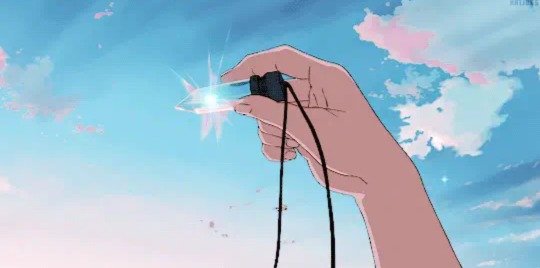
premise: you could've sworn the transmigration curse didn't have an effect on you... so what exactly are you doing here?! (alternatively, you tumble straight into your favorite video game; and you're kinda fucked)
...or, a genshin manhwa otome game inspired au.
act i: scaramouche, alhaitham, wriothesley.
↳ act ii: lyney, neuvilette, kazuha, kaeya. (next)
warnings. fem!reader but can be imagined as genderless if u'd like hehe, a shit ton of manhwa tropes in one, this is a hot mess aka not proofread all that much, half clunky half decent writing
a/n: as promised via the poll heh,, while i do plan to make this an actual au, im not that sure ^^; just the tip of the iceberg here tho!!
MAIN MASTERLIST | AU MASTERLIST (coming soon)

YOU — unsuspecting civilian turnt transmigrator
you've always been too attached to fictional characters for your own good.
yes, even the ones that are remarkably irredeemable (the power of a backstory is very formidable) and complex (complexity is a virtue!)
villains have always been destined to die, be cursed, or destined to curse others. it was heartbreaking, really. you've wished for a chance to rewrite their fates for them to find even a sliver of happiness, even when the fate of their plot says otherwise.
which is why when you find yourself awake into the game of your dreams, “Teyvat's Seven Stars”, like any lover of cliche novel and manhwa tropes, this is the time you think that maybe life wasn't so shitty on you.
....there's only one tiny, teensy, itty bitty problem here, actually.
you're not the protagonist. you're not even one of the protagonist's faithful friends and underlings that light protagonist's road to conquering the world and its men (and as of the 4.0 update, it's women); no, you're none of those.
you're a no name extra, and not to mention, a character involved with the game's main villain characters who are coincidentally the love interests of the game's black route!
[ unlock transmigration package: ultimate transmigrator's route ( ????? MODE ) ]
[ no ] [ yes ]

( 国崩 ) SCARAMOUCHE — the tyrant
“as of today, you will be engaged to crown prince kunikuzushi, who is her grace the shogun's rightful heir to the throne.”
when given approval to stare at your so-called soon to be husband, you expect the worst, mostly. the multitudes of character dialogue you've played through detailing his rather discourteous personality (which basically meant he was a huge asshole) don't exactly paint a pretty picture.
however...
who was this tender hearted looking scaramouche that ‘obliterated armies in the blink of an eye?’ the t in tyrant stands for tyrannical, not timid!
eyes like lighting framed by the longest eyelashes you've ever seen and an unfairly pretty face, comparable to a fair lotus. after fawning over his otherworldly countenance, a sinking realization of dread pools in your stomach.
oh, you are so screwed.
essentially tied to the indigo-haired ticking time bomb of a future tyrant due to the strong standing of your family for a period of until the main story starts, you're destined to never get crown prince scaramouche's affection, being his fiancée who scaramouche is arranged to for political means only.
not to mention, you're in an even more deadly position; of all the characters you switched souls with, it's the one that essentially dies by their own fiancé's hand because they were horrible to him! what atrocious luck!
frantic, you wrack up about three ways to survive.
plan a) win over the shogun's favor by being an appropriate partner unlike the original flavor of this body, who resorted to bullying the innocent prince and unknowingly digging their own grave or b) be a guiding friend to scaramouche as he learns the ways of the world and c) make sure you don't end up giving the protagonist a bad ending via his twisted personality.
weighing all these options, you decide to do all three in hopes to cement a life instead of a deathflag. prevention is better than the cure (aka: the protagonist) after all!
(you may also just want to spend time with your favorite character. having a time limit and a sign that says ‘i'll die in the future!’ should at least warrant you extra time to show some affection to scaramouche, at least.)
so, you do what anyone in your position would do: give affection! lots of it.
admittedly, it wasn't all flowers and rainbows. scaramouche—ahem, kunikuzushi—was very shy and reserved indeed, with his mother ei even worse off! (besides, who trains and studies all day and has to stop crying every time they were injured?! that was just too much!)
it was rather hard at first, the frigid atmosphere of the usually silent Tenshukaku Palace almost impossible to permeate. but with your amazing charm (read: deathflag radar) and social skills, you manage to let the members of the Royal family open up to you.
speaking words of praise in ei's cooking (a very difficult feat to accomplish), spending afternoons with your fiancé and teaching him ‘how to be a shoujo worthy male lead, name-version’ (very confusing to explain), and the cherry on top, driving away that vile teacher of his—the Doctor—once word got out that he'd been taking advantage of scaramouche as a political puppet king in the future. trauma enabler destroyed! look at your immeasurable powers!
(“you're not a failure.” clasping kunikuzushi's hands in yours as he reels back from you. damn that doctor.
his tears shot a wave of heartache through you. you can't bear to see your favorite in such suffering. “whatever happens in the future, i won't abandon you.
no matter what, i'll always be on your side, okay?”
kunikuzushi looks at you with something in his eyes—something like adoration. “do you promise that?”
“yeah.” you say without hesitation, the glow of the sunlight hitting your face so dazzlingly that kunikuzushi's eyes widen that his mouth hangs agape in awe. “i promise, kuni.”)
to your greatest delight, your efforts worked in your favor.
ei now spends time with her son, and though it's almost always just a tad bit awkward, you and the guuji yae miko get the two to strike up conversation, and overtime, kunikuzushi becomes more open to you.
(“[name], what kind of man is your type?”
“huh? well...” you think for a while. this was a great opportunity to say it, right? that life changing protagonist quote!
“to me, the only person i'll ever like the most is you, kunikuzushi.”
“do you really, really mean that?” and oh, he looks so cute—flustered and red from your words. worth it.
“yup! now, i made some shimi chazuke, try some—”)
(admittedly, lots of favoritism is involved.)
—and while you reap the fruits of your hard work, you spend warm, sunlit afternoons with ei at tea, even learning about other nations from scaramouche's aunt nahida and even befriended a few of his future affiliates—childe (though for some reason, kunikuzushi always pulls you away from him whenever he spots the two of you together), signora (she tolerates you, you think) and etcetera.
(“then, if i do well, can you kiss me on the cheek, [name]?”
you agree, much to his delight. scaramouche avoids the gaze of a certain pink haired fox eyeing him questionably. unbeknownst to you, he glares at the woman's scrutiny.)
unprecedented things unrelated to the plot happen too; like how your family, which basically only saw you as a political bargaining chip and an unwanted child they could get rid of easily—no longer sent you any demeaning letters demanding money once scaramouche found out....
(“they've been leeching off of you for how long?” so scary... is this was kunikuzushi is like when he's worried?)
(“...kunikuzushi, how long will you keep up that weak-hearted facade of yours? if they find out how.... dishonest you are....”
“i don't need the reminders of a foxy old hag that doesn't know her place. this is fine as it is.”)
(you don't need to know.)
but, you're nothing compared to the inevitable flow of the plot. inazuma is wracked with war, and it just so happened that you'd been unceremoniously kidnapped by a certain resistance leader's trusted general, used as a hostage bargain for approximately the majority of your life. in the worst moments in your dreary cell, there's only one thought in your mind.
....kunikuzushi's face, devastated when he tries to reach for you, before slipping away from him like sand— face morphing into an unbridled state of rage that's too natural, too familiar. when did he learn to make a face like that?
(they say the kingdom was wracked with thunderstorms all night that day.)
afterwards, fate doesn't make it kind for you.
years go by in the blink of an eye, with your capture fervently forgotten in the midst of the growing animosity of the two conflicting forces.
although you did hear that yae sent out a search party for you while at the resistance's base, the shogun's forces never reached you.
eventually, you got released secretly by sympathy of kokomi, the leader of the resistance, who felt pity for you getting caught in the crossfire. letting you go under the condition that you'd likely never meet any of the precious characters you've gotten to know and change was a heavy price to pay, but you didn't have any choice.
indeed, no matter how much you tried to divert the plot, your duty as an extra has ended, and you were even lucky to even be alive. you could only hope that your fiancé—ex-fiancé—took note of your lessons well, bidding farewell to inazuma as you hop on the boat to mondsdat.
by now, you at least hoped that scaramouche and the protagonist met, his true chance at happiness starting now that you were basically dead.
(even if your heart felt like breaking into a million pieces.)
....is what you thought would happen, but why is it that after three years from your supposed capture, inazuma was still at war?
“that crazy prince... he's still working to find his former fiancée... and he's razing almost every village apart looking for them!”
“—didn't the shogunate say that whoever finds her would receive almost 3 million mora?”
“the entire lot of them are lunatics, i tell you. all because of a missing person, too!”
what's more, why was it still going because of you?!

( 艾尔海森 ) AL-HAITHAM: the information guild master
to be fair, normal people don't really run into one of their favorite characters often after transmigrating.
but to be fair, again, you certainly didn't think you'd actually be in your favorite video game franchise caged in bed with essentially one of its main love interests.
eyes wide and unceremoniously looking—definitely not ogling— at the toned body that's currently enveloping you in its arms, the soft tuft of ashy gray hair caressing the crook of your neck, murmuring incoherent mumbles of—is that another language?
???????
you blink, looking down at the bare body currently embracing you. oh. oh.
you're an extra.
you're just an extra, but why are you in bed, currently being served breakfast by the most gorgeous man you've ever laid your eyes on, with a pretty view of the rainforests' canopy?
“you should lie down. if i recall, sufficient sleep is required in order for the human body to perform its basic bodily functions. although our partnership is temporary, to let you fall to harm is a situation i'd like to avoid as much as possible.”
“....what?”
“...?”
the guild master, al-haitham, is a character in Teyvat's Seven Stars that is heavily debated on whether he's technically a villain or not. in the game, he's the right hand of sumeru's leader, nahida, working as the overseer of the AKASHA, a guild that gathers information to the nation's leader. he's a pretty shady character—always working behind the scenes and very unfalteringly blunt—and a ‘villain’ for crown prince scaramouche's route, helping the protagonist escape his clutches.
he's often the subject of comedic ire, his banters with a certain broke architect always the highlight of any bonafide al-haitham fan.
“we're expected to work together by lord kusanali's decree in the duration of investigating the hivemind project the lord suspects the baron siraj is partaking in.”
right, that one scene in the game where al-haitham needed to go undercover to infiltrate a coup de etat staged by one of the factions against nahida... right... what.
you were that extra! the one that fell in love with him and pined for his affection!
(“well, i get that part, but does sleeping together really have to play a part in this...?”
al-haitham gives you a mere quirk of the lip, tilting his head. “we do have to play the part of a married couple in dire straights, do we not? this cover is more efficient.
...besides, i don't have anything to complain about. you're certainly better company than kaveh.” )
in truth, al-haitham wasn't bad company. far from it. aside from the internal giggling and fangirling (you) and the incredible stack of books (alhaitham) that you have to see more than the grey haired man on a daily basis, the two of you work out a rapport that stems from memories of the body you transmigrated in.
he's nice to be around, surprisingly considerate when he wants to be—he tells you about the books he always reads....
(who even reads ‘20 Tongues Language Memorization Guidebook: A Basic Overview of Vocabulary and Terms’ for enjoyment?
the content makes your head run in circles because of how complicated it is; but who wouldn't like to listen to an extremely attractive man overexplain to you with a calm and pretty voice?)
...is generous enough to provide meals and cook dinners that have you crying tears of gratitude because you know how awful yours compares (it was either too bland or too seasoned; al-haitham is surprisingly picky when he wants to be)
(you assigned al-haitham the title of “absolute s-tier husband material”— his capabilities are out of this world!)
by chance, you once gave al-haitham a little tidbit of information that proved to be valuable later in the investigation—courtesy of your avid game knowledge—when you two had been lost to the psychological illusion magic cast by siraj when you two finally broke in his estate.
(“whatever happens, if siraj messes with your mind, just make sure to think of me instead of anything else.” al-haitham lets his hand find yours.
“you once asked me if i trusted you, [name].”
“....” you're treated to one of al-haitham's rare smiles, one that warms you up from within. “i do. so don't let yourself get hurt.”)
however, your temporary partner had faltered for once, flinching when siraj took the form of his old grandmother who'd passed to exploit al-haitham's mind, hesitating and frozen in place while siraj inched ever closer to finding out his weakness.
and you couldn't stand it, the character you cared for—the al-haitham that always had a plan, always knew how to stay calm, had looked so unsure and hopeless.
(“wake up, al-haitham!”
with you cradling his face, al-haitham stares back at the only constant in the memories of his grief, eyes meeting yours. “you don't have to do it all alone. i'm right here, aren't i? believe in me.”)
your (fake) husband snaps back to reality, finally allowing enough time to apprehend siraj and put a stop to his malicious project.
(“thank you.” al-haitham tells you solemnly. it hits you that this may be the last time you may ever see him. “i'm grateful that you brought me back to y— to my senses.”
there's a sincerity in your voice that rings from your heart. “anytime, al-haitham.”)
you thought that was the end of it.
defeating siraj meant you two no longer had to associate with each other, but somehow, to your great surprise, al-haitham doesn't stick to the plot at all. you were sure you didn't interfere with the game, though?
for some reason, al-haitham doesn't erase himself from your life, unlike the original route's flow.
in fact, he's become... easy to run into, a constant in your otherwise mundane life. he takes you out to lambad's tavern for an occasional drink, says he's lending you his headphones when you find yourself overwhelmed by the city (you were never good with noises) and even helps you out as you vent your problems to him.
(the day after, said problem conveniently disappears. how strange....)
and most of all, allowing you to enter his personal space... leaving kaveh's jaw dropping when he accuses al-haitham of having a lover.
“you're always going who knows where with them! what else is there to figure out?”
“...we are merely friends.”
“a friend that you let into your personal library? do they know that you still keep the ‘fake’ ring in a box inside the closet?” kaveh laughs. “nice try, al-haitham.”
(after all, kaveh could never unsee the way al-haitham's eyes softened at the feeling of the head on his shoulder lean onto him, with you no doubt asleep. he even took his headphones off! kaveh has never seen him actually take them off in order to keep the person who's sleeping on his shoulder as undisturbed as possible.
in fact, kaveh doesn't think he's ever seen al-haitham be this touchy or considerate with anyone this much before.
.....and most importantly, kaveh would never forget the way al-haitham, a man who found no merit in politeness and preferred bluntness, a man who preferred solitude rather than company—deliberately getting close to someone—pressing a fleeting kiss on the crown of your head.
kaveh blinks. it seems even the throes of love can reach even the most unconquerable of peaks....)

( 莱欧斯利 ) WRIOTHESLEY — the monster duke of the north
“—i need you to gather information on duke wriothesley. serve him undercover as one of the prisoners of the fortress.”
the duke of meropide—a man swamped with terrible rumors. they say he was exiled from the nation due to murdering his entire family. they say he possessed a face worthy of the title of a beast— grotesque, littered in scars. they say that any who end up in his estate, the iron prison of the north, meropide, never saw the light of day again.
(“only criminals of the worst kind are fated to be sentenced there. nobody returns, so we've stopped questioning it...” )
so to say you're not fearing for your life that bad right now is a massive understatement.
“now, mind telling me how you were able to sneak into the most impenetrable prison in all the land, miss prisoner?”
how did it end up like this?
so you wake up and find yourself in jail. lovely.
seriously, of all the places you can transmigrate into, why did it have to be fontaine?! Teyvat's Seven Stars chapter 4's main starting point, the nation of justice is littered with dark themes and high difficulty capture targets.
.... such is the case with the man in front of you. unlike what the rumors of him say, duke wriothesley paints a rugged yet dashing picture of a nobleman, even if he was —if you recall— one of the hardest capture targets to conquer in the game.
a villain character who you played once during one game route, acting as the driving force during one of the love events of one of the protagonist's other love interest, lyney. duke wriothesley almost assassinates lyney's younger brother, freminent, leading lyney to rally up a certain group to bring the nobleman down.... a typical side character villain, who's existence was added as late as 3 patches away from lyney's.
(even inazuma would be better than this! at least the tyrant route could be avoided, and let's not mention the easy sumeru route as well...)
“well, miss prisoner, cat got your tongue?”
in summary: fortunately for you, the body you transmigrated is in the position to spy on the current affairs of the fortress of meropide, with courtesy and with permission of one of Fontaine's leaders, neuvillette. unfortunately for you, it seems our dear monsieur wasn't able to inform wriothesley beforehand, leading to the current situation.
aka, you're pressed dangerously close to wriothesley's chest, with a knife at his throat and his hands pinning you against the wall, noses almost touching. you're not sure if this is even the kind of tension that two people who are trying to kill each other are supposed to have...
(“i'm an ally!” you sputter out. wriothesley raises an eyebrow at you. “monsieur neuvillette sent me.”
“how am i supposed to trust you after i saw you slinking around here, knife at my throat?” he replies, eyes narrowing. “i know that i'm labelled as a beast, but i don't really know what came over that pretty little head of yours when trying to sneak into my chambers.”
what does he take you for?! “...are you accusing me of something indecent?!”
“just saying — i've met lots of prisoners with your excuse, my lady.”
“i'm prepared to use this knife, you know.”
“hah.” wriothesley grins. “how aggressive. more aggressive than most. do you want me that bad?”
“stop twisting my words!”)
in any case, you hate wriothesley. you know he's one of the characters in Teyvat's Seven Stars and is a villain for one of the easy love interest routes in the game, but his personality is... a real piece of work.
you'd rather the protective and kind kazuha, or even the charming and elusive lyney! why did it have to be him?
not only did he not believe you, he even told you to prove your authenticity! you're just glad that his assistant sigewinne had been there to vouch for you — you're not sure if you'd even be on your two feet right now if she didn't.
so now you're stuck constantly on your feet, running to and fro — helping the dark-haired man record new prisoners, establishing trading routes to the main city of Fontaine, and treating other prisoners of the fortress with sigewinne.
your biggest surprise by far, though, is just how... different the duke is from the rumors. his scars were merely battle scars of honor (to which sigewinne rolls her eyes, “your grace, please stop trying to look cool”) he got from various succession fights, not scars to show how he was cursed to turn into a beast. he has a love for tea, but always seems to have a cup of your favorite blend with him when you feel tired after a long day of working (laboring) for him and the estate.
(“your daily report of new convicts, your grace.”
“-this is the tea you like, your grace. i've prepared it in advance.”
“you're very adamant on proving yourself. aren't you sick of such tasks by now, miss prisoner?”
“no.” wriothesley's expression screams 'why not?' on it. “ it's because of my own misjudgement of you.”
“...elaborate.”
“i may have had unnecessary prejudices on your conduct thus far. but you're... not like what the rumors paint you out to be.” you say sincerely. “you're more amazing and incredible than anyone else. i truly do admire you.”
wriothesley's expression; you couldn't decipher it. “i see.”)
he's battered, but caring. sigewinne makes you watch (in horror) as she doodles cartoonish looking characters on his face when he's asleep — wriothesley never fusses, only an exasperated sigh to his assistant. he's harsh with his tasks and duties, but is the first to rush you into sigewinne's infirmary to tend to you after you pass out from overwork.
(“don't worry, [name]. the duke may not look it, but he's very gentle!” sigewinne giggles. humoring the little girl who was the first to show you actual decency in this place, you try to nod. sigewinne doesn't seem convinced.
“i'm serious! after all, compared to other people who've snuck into the fortress, you're the first he's treated this way.” she says cheerily.
“what does that mean?” you can't help but scoff at that. “so he just works someone to the bone from the get go?” you shudder. damn production zone...
sigewinne blinks. “ oh no, not like that. it's just that he's never been so lenient before. in fact, when you fainted, he even gave me the order to prioritize treating you over anything else.”)
well, this wasn't exactly what you thought you would be doing when you transmigrated into your favorite game, but you suppose you can take it.
besides, you'd miss a certain duke otherwise. life truly is full of strange twists....

a/n: thank you for making it this far! if anyone asks why wriothesley's was short, listen, this was completely impulsive and i was out of inspiration LOL, but i do hope you enjoy! look forward to new parts though hehe :3
@ ICEUNHIE: do not repost translate or plagiarize my works.
#teyvat's seven stars ☆#mhie's spirals#genshin x you#genshin impact imagines#genshin impact x reader#genshin x reader#scaramouche x you#scaramouche x reader#scaramouche x y/n#al haitham x you#alhaitham x reader#al haitham x reader#alhaitham x female reader#al haitham x y/n#wriothesley x you#wriothesley x reader#wriothesley x y/n#scaramouche genshin impact#alhaitham genshin#wriothesley genshin
3K notes
·
View notes
Text
not going to tack this onto @derinthescarletpescatarian's post because it was long enough but here is my understanding of some of the various subgenres commonly encountered in light novels/web novels/licensed webtoons:
isekai: another world. if they end up in a different world it's an isekai. it doesn't matter how they got there. sometimes the other world is explicitly a video game the protagonist is playing. they're not dead or anything, just in virtual reality. they go home at night and it's fine.
portal fantasy: it does matter how they got there, actually. they went through a portal of some kind. wherever they end up, they keep their minds and bodies. maybe in the other world they have powers, but maybe not.
progression fantasy: they are going to level up like a video game character. there may or may not be an actual leveling up mechanic. they might just get stronger or acquire more wealth and powerful allies as it goes on. they will always kick more ass. hundreds of beavers is a progression fantasy.
litrpg: western term for 'the characters explicitly have video game mechanics'. there is probably a System of some kind. characters are aware of levels and power tiers. most controversial subgenre, lots of people hate this.
dungeon break/monster hunter: dungeons or portals appear in the real world, some people get powers that let them fight the monsters. lots of people try to tell me this is just litrpg but i argue that they are distinct subgenres with significant overlap. not every litrpg is this. you can probably find traditionally published american versions of this pre-dating video games and the litrpg concept.
transmigration: this is when truck-kun intervenes. there are other ways it can happen, but usually a character dies (hit by a truck is the most common trope) and wakes up in a different body. usually an isekai, usually it's into a story or video game, but it doesn't always have to be.
regression: a character dies, but instead of dying, they wake up as their younger self with all their memories from before their death. this is explicitly not an isekai, except when someone gets fucky with it and reveals that a transmigrator was actually also a regressor the whole time.
loop: if they regress more than once it turns into a loop. this is distinct because sometimes with regressors they just have the one chance to not fuck things up this time. some loop stories also have characters transmigrating a bunch of times.
villain isekai: usually transmigration. oh no i died and woke up as the bad guy in a story! now i gotta try not to fucking die!!!
romfan: romance fantasy. it gets called romfan instead of romantasy because it came first and is being translated probably.
otome isekai: also usually transmigration and also often romfan. you are now the prettiest princess and all the boys want to kiss you. i assume there's a 'harem' version of this For Men but i don't read those and can't tell you anything about them.
villainess isekai: usually a combination of the above three. most likely to be very meta and funny. i have a weakness for these ones.
divorce revenge: there might be a real name for this but i don't know it. sometimes this is paired with regression but not always, but it's very often a kind of progression fantasy. features a woman divorcing her shitty husband and then living her best life, which keeps getting better as her husband has to watch her kick ass and then cry about how he blew it. there are so many of these.
childcare fantasy: i think this includes both the ones where someone transmigrates into a baby, and the ones where they transmigrate to take care of a baby. i don't like this genre enough to check. but 'formerly abused child gets loved and coddled and anyone who tries to hurt them suffers' is a major component of this subgenre.
there's definitely more but my attention span has waned. here's some comics that are on my reading list after the cut, there's going to be undescribed screenshots because i'm lazy. you may need to find these elsewhere if you don't want to deal with tapas or webtoon and their paywalling systems.
The Greatest Estate Developer: transmigration villain isekai and progression fantasy with litrpg elements. architect uses his knowledge to save his own ass and also his new family, gets powers, everyone will unionize whether they like it or not.
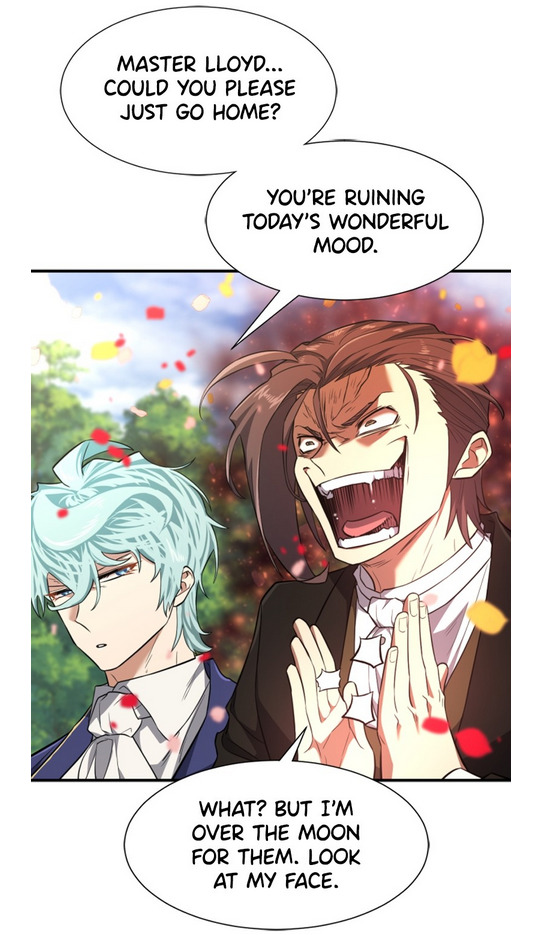
Lout of the Count's Family: transmigration villain isekai and progression fantasy. ends up in otome isekai recommendations a lot despite technically not being an otome, on account of the eye candy and shipping potential. the webnovel has turned into like six different genres by now and is asspull central but i read it anyway. protag says he just wants to save his own ass so he can relax but does it by coughing up blood constantly.
The S-Class Hunters That I Raised: regression dungeon break litrpg. guy with shitty powers regresses and has to figure out how to make his power of taking care of people suck less, turns out it's OP as all hell.
Villains are Destined to Die: villainess transmigration otome isekai, maybe a little litrpg? there's definitely a system. protag just wants to go home because the visual novel she's in is notoriously difficult and she is at constant risk of being murdered. i like this one so much i own it in print.
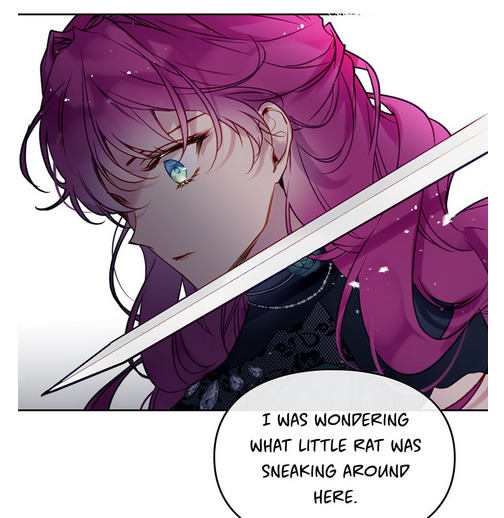
Marriage of Convenience: regression romfan. not an isekai!! protag hated her life and died in poverty and shame after her husband died, this time she's going to try not doing that.
Villainesses Have More Fun: villainess transmigration otome isekai and progression fantasy. protag is very excited to be the villainess because she was the best character. she loves being rich. unfortunately at least one plot point raises the question 'why is that boy white'
Beware the Villainess: villainess transmigration otome isekai, meta as all hell, extremely meme-able faces, does not end in an OT3 but should have.
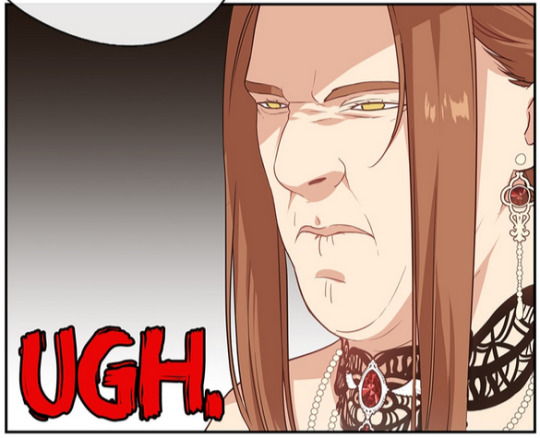
Baroness Goes On Strike: regression romfan, also not an isekai. protag wanted a divorce on her deathbed but woke up on the first night of her marriage, wants her life to suck less this time through the power of being assertive.
The Perks of Being a Villainess: villainess transmigration otome isekai and progression fantasy. protag has resting villainess face and progresses through the power of advanced math, unregulated capitalism, and abuse of the patent and copyright systems.
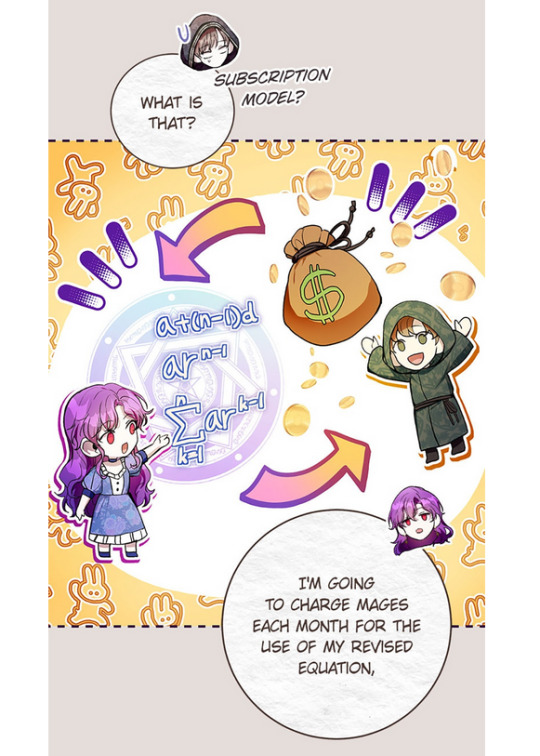
I Think I've Been Possessed Somewhere: transmigration isekai starring a main character who's read so much romance fantasy that she doesn't actually know what genre she's in because everything is too generic. meta as all hell.
Your Throne: villainess, sort of transmigrator? the crafty politically-savvy villainess bodyswaps with the naive saintess heroine, shit gets dark real fast, probably not going to end with girls kissing despite my hopes and dreams.
The Remarried Empress: divorce revenge romfan. you see this one referenced a lot in the comments of other romfans because everyone hates Rashta, the waif that the emperor divorces the empress for.
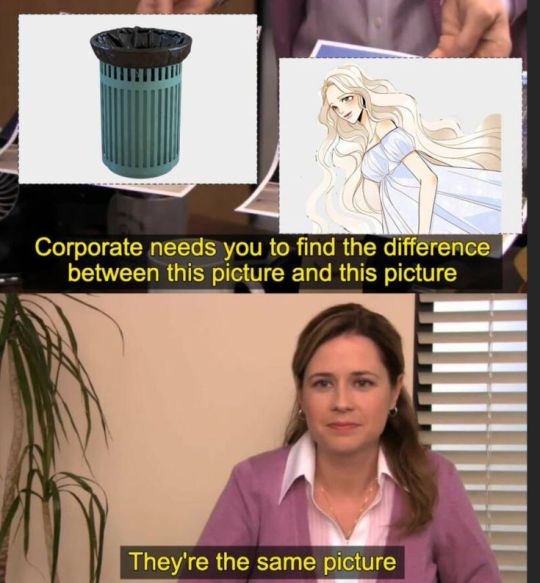
Raising My Fiance With Money: romfan, fake dating, sort of a divorce revenge except it's her ex-fiance. no isekai elements at all, but the protag is ridiculously lucky with money, comically wealthy, and supported by her doting family despite having terrible taste in men. her love interest is a teddy bear with resting murder face.
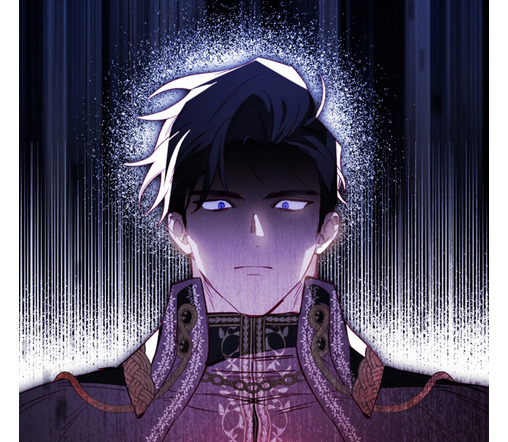
When The Third Wheel Strikes Back: transmigrator isekai. the protag never actually read the book, he only knows about it through osmosis because it's hugely popular and his sister is a big fan. one of the only things he knows is that in a recent update his character dies. also, it was already a transmigrator isekai before he got there. he isekai'd into an isekai. so much of the worldbuilding suggests a canon ot3 but i refuse to get my hopes up.
Omniscient Reader's Viewpoint: it's sort of a dungeon break. not really an isekai but kind of. litrpg, sure. there's regressors. there's transmigrators. there's a lot going on. kim dokja was the only reader of a terrible, ridiculously long webnovel that now appears to be coming true. the official adaptation appears to be making the webnovel less queer overall. i read the webtoon until i got impatient enough to force my way through the sometimes clunky webnovel translations. it's hard to explain orv because it's a story about stories. consuming stories, telling stories, stories told about you, becoming a story, the cost of a story. it is so long. there is so much happening. the story is resolved in the epilogue you might skip if you didn't know any better. some people find it too confusing while others read homestuck.
1K notes
·
View notes
Text
Unfortunately I came across a very strange and misinformed video about Black Butler.

It’s not good. Don’t watch it. Unless you wanna ruin your day, in which case have fun.
Despite it all, I watched it. What left me wondering, however, was how off the mark the person who made the video was on, well, everything.
From their insistence that the Book of Circus Arc theme or point is non existent, to reading Ciel’s character so badly they genuinely thought the Green Witch Arc did nothing for his character development.
While baffled, it also made me think on how someone could read Black Butler so badly.
Sure, you can say that there’s no real way to read or interpret something “in the wrong way” but interpreting The Hunger Games as a pure battle-royale action story would make you believe it’s bad.
“Why are we focusing so much on how the capitol preps them?” Or “Why isn’t Katniss winning everything?” Or “I wanna know more about the rebellion” All questions that miss the actual point of the story - which is criticizing (not solving or ignoring) the way that media distracts us from violence via spectacle.
The same thing applies here. While there is no “right” way to consume media, there’s things that the author makes clear they wanna focus when creating a story. Things that, if you understand, make the story you’re reading actually make sense.
And in Black Butler there’s three things that you have to understand to properly get what Yana is saying.
Sebastian is the protagonist
Ciel and Sebastian’s relationship IS the story.
And that relationship is, fundamentally, a positive one.
A quicker version of it would be:
Black Butler is a love story from the POV of Sebastian, and you have to ship it to get it
- but that’s not entirely true.
You can still look at it as a complex but ultimately positive rship and get in broad strokes of what it’s conveying. It doesn’t have to be romantic. Although, it helps much more than a platonic framing.
(That said, interpreting their rship as father and son, still isn’t the best way to go about it. Mostly because by its very nature of “soul consuming” their relationship is extremely sexually charged. And hey, if you’re into that I don’t judge. However, if you’re desperately trying to interpret their rship as NOT romantic to the point you fall back on heteronormative patriarchal ideals of nuclear familiar as framing device, I don’t think this interpretation bodes with you)
Now, having all that ground work:
Why do I say these are the key components to understand BB?
Okay so, first,
1. Sebastian is the Main Character. The protagonist.
There’s a lot of people who wanna argue against it, claiming he’s either the villain or the antagonist. Both wrong.
He does not function as an antagonist. Even if, and an emphasis on if, you consider Ciel to the protagonist, Sebastian isn’t a narrative antagonist.
If you wanna go back to Creative Writing 101, be my guest. An antagonist is directly defined by the protagonist. It’s the opposing force. If the protagonist wants A, the antagonist wants to stop them from getting A.
Sebastian’s catchphrase is “Yes, my Lord”. He never opposes Ciel, in fact quite the contrary. By the mere fact they’ve created contract, it means that they’ve both agreed in the inevitable outcome.
People want to frame Sebastian as the villain, because Ciel having his soul taken by a demon, would be a BAD END in the context of their moral compass. They see Ciel as a frail victim of abuse, who’s being tricked by Sebastian, who wants Ciel’s soul.
Which is an. Interpretation. A bad one. But still one.
The narrative (and whether the narrative fits your personal moral compass and lack of critical thinking is irrelevant) treats Ciel as an agent in his own destiny. The abuse he suffered was the moment in which he had no control. It’s only after he meets Sebastian that he can rid of both his guilt and his despair, and do what he wants.
In this case though, it’s revenge.
The famous “Asthma” scene shows this. If Ciel is taken back to his past, he becomes helpless. Swarmed with pain and memories that make it so that he can’t even react. Sebastian is his saving grace. If Ciel didn’t have him, and the power he wields to rebuilt what’s broken, he would crumble once more.
If Ciel has a panic attack, because of all the pain he has, Sebastian picks him up and says “you are not a helpless child anymore, you are not a victim anymore, you have the power to do anything. So, what do you wanna do?”
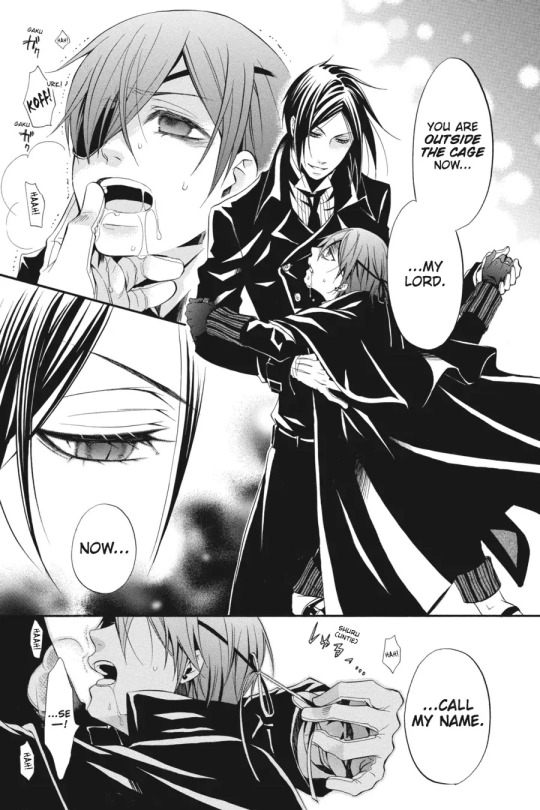
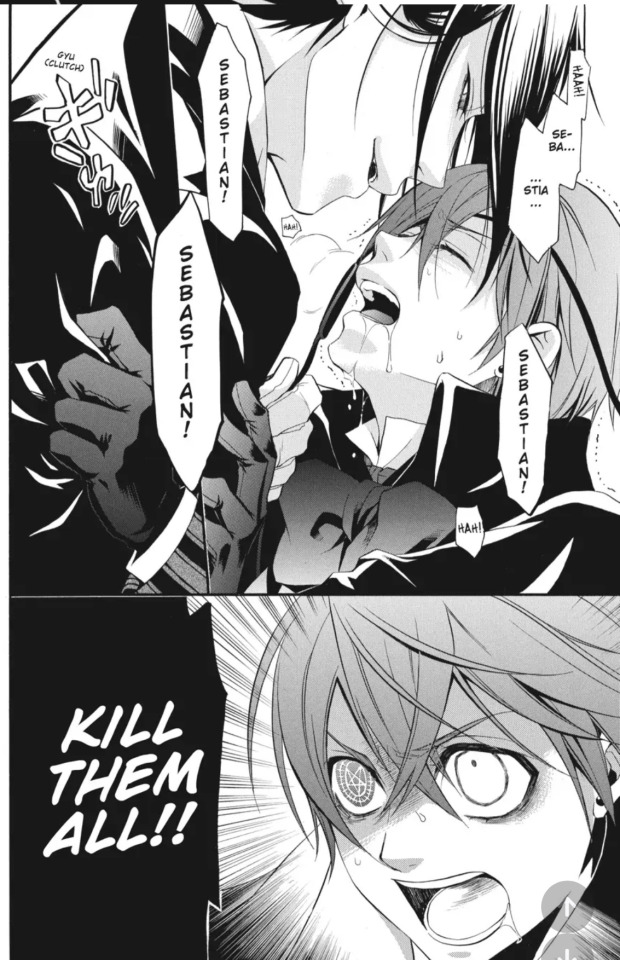
Ciel’s answer is to kill them.
A proper analogy would be to say that, if Sebastian offers a gun, Ciel pulls the trigger. They are both at fault. Sebastian, strictly speaking, is not here to directly cause Ciel’s downfall, but as a tool Ciel uses to plunge into the abyss.
If, again if, you were to frame Ciel as a protagonist, Sebastian falls closer to the “Voice of reason” character. Not a literal voice of reason, but a literary one. If you have a protagonist and an antagonist exchanging ideals, the Voice of Reason serves to engage with the protagonist on their own ideals.
That said, Ciel isn’t the protagonist. The story quickly falls apart if you interpret it as such.
Things such as Ciel’s character arc being…shall I say odd?
It’s not that his character arc isn’t there, but it’s never lineal. His goals stay the same, the only thing that happens is that we start to peel back the “why”s of his goals. Throughout the series it’s never about Ciel understanding himself better, he knows who he is, he knows what he wants, he knows why he wants it. He doesn’t ever need to uncover these, but simply remember them. Because it’s always about the audience understanding Ciel.
He knows he wants revenge.
In the Circus Arc: He knows that he needs Sebastian because without him, the pain of the abuse he suffered would be too much to bear. But WE are introduced to it.
In the Book of Atlantis: He knows that with this new lease he does not want happiness and peace, he wants revenge. The one being told this is the audience.
In Green Witch Arc: He knows that their revenge isn’t for his family, the real Ciel or guilt. It’s because he wants it. He’s angry, he’s upset, and this is entirely for him. The one being told this is the audience.
Except. Not really. The one either discovering or remembering these key moments - is always Sebastian.
Sebastian is the one who reassures him that he now holds the power of a demon to override the pain. Sebastian is the one who remembers that to override that pain, Ciel wants revenge. And Sebastian is the one who discovers that that revenge isn’t built out of grief or guilt, but for himself.
We are witnessing it all, through the eyes of Sebastian.
This is why we have an extremely vague idea of who Ciel is, Sebastian does not have the whole picture.
If you haven’t been reading this manga with your eyes closed, you’ll realize we have a better grasp at Sebastian’s character than that of Ciel. We get a lot of insight on how he thinks and what he values through light hearted dialogue he has with the servants. You even see the character development in these little interactions.
Think about how when he first arrived to the mansion he magically created food with no regards to taste, but when he meets Bard he states that food is created to see whoever will eat it, smile.
That is character development, more than you will be able to see from Ciel.
Because Ciel’s character, while not static, doesn’t go from point A to point B. Mostly, cause it doesn’t need to. He went through that when he lost the real Ciel and got Sebastian. Everything we are watching is the falling out.
Now, given the fact that I’ve told you that it makes more sense for Sebastian to be the protagonist/main character, and that he 100% isn’t either a villain or antagonist in ANY of the interpretations you can get:
Do you believe me?
If you don’t, you’ll probably believe Yana herself.
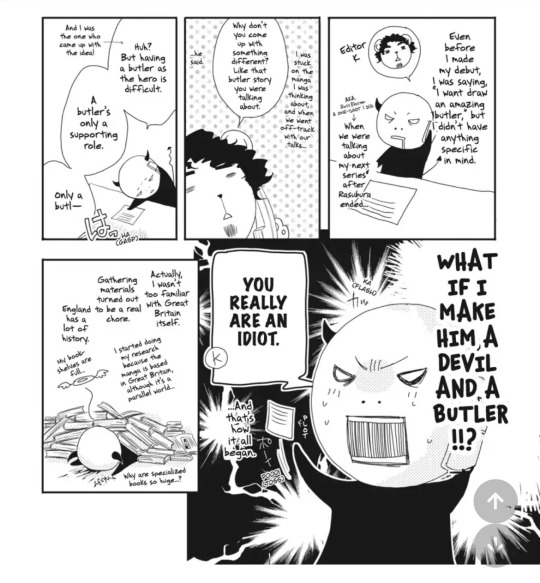
This is from the first Volume, where Yana herself describes the process of making Black Butler. The primary idea behind the creation of BB was a butler as a “hero”.
If you go back to the introductory chapter, you notice that Ciel is barely mentioned. He’s simply the one to give Sebastian impossible tasks and standards that Sebastian must find how to overcome.
Ciel is properly introduced until the NEXT chapter. The second chapter has this formula too, introducing Lizzie as a problem to overcome. Although, to Sebastian the best way to “get rid of the problem” is simply to indulge her.
The issue here being that the problem isn’t as simple as a business meeting but something directly tied to Ciel and Ciel’s past. Each time that Sebastian has to solve a problem, it chips away at Ciel. While with Lizzie he shows a persona, once he’s alone with Sebastian he acknowledges the toll it took on him. It serves to build Ciel as Sebastian’s master, and how some problems aren’t as simple as discarding a tablecloth.
The third and the fourth, are a unified narrative, with a similar premise to the first chapter. Ciel gets kidnapped and Sebastian must find a way to retrieve him without raising suspicions.
If the first chapter is to set up what Sebastian must do as a butler, the third and the fourth serve to set up what he must do as a demon.
The entirety of the volume, and up to Book of Circus Arc, is about how Sebastian tries to follow the increasingly absurd orders that Ciel has - it is not about Ciel trying to solve them.
That’s how they work, we follow Sebastian for the most part, because he’s the one having to come up with the solutions.
If anything, in early Kuro, where the emphasis was more on a slice of life conflict, Ciel is the antagonist. He’s the one creating problems for Sebastian to solve.
What’s more, in the second volume, the very first chapter is one from Sebastian’s POV. So far, we hadn’t gotten an entire chapter from Ciel’s POV. In fact, I would find it hard to point to a single chapter where Ciel is the POV throughout. The reveal of real Ciel and the flashback is the closest contender.
But once we move past early Kuro, and into Book of Circus, this set up changes.
It’s fairly easy to assume that Ciel is the main character, because from this point on the conflict of the plot sorta surrounded him. We spend a lot of time with him and with his story. The enemies start being people directly tied to Ciel and Ciel’s trauma. Rarely, if at all, we get to see Sebastian before he met Ciel.The framing device for the story, is Ciel.
This is where point 2 gets intertwined.
2.- Sebastian and Ciel’s relationship IS the story.
The story begins at the point where Sebastian and Ciel met. Who Ciel was before he met Sebastian, informs why he’s the way he is when he does. You have to know all he went through to understand why he’s a brat, why he lashes out. However Sebastian’s past doesn’t matter…because Sebastian himself doesn’t care much for who he was, before he was “Sebastian”. That’s also part of the narrative.
Unlike Ciel, he doesn’t seem opposed to revealing information from before the contract. He talks about how pets from where he is from are gross, he talks about how he knows how to dance because of other places he’s been to, and alludes to the life he's lived before.
Just that, to him, they're footnotes.
He makes allusions to a very bland, uninteresting life, up to the point he meets Ciel.
That’s why we don’t know more about his past.
As for why we focus on Ciel’s story…okay maybe we need Creative Writing lessons 102
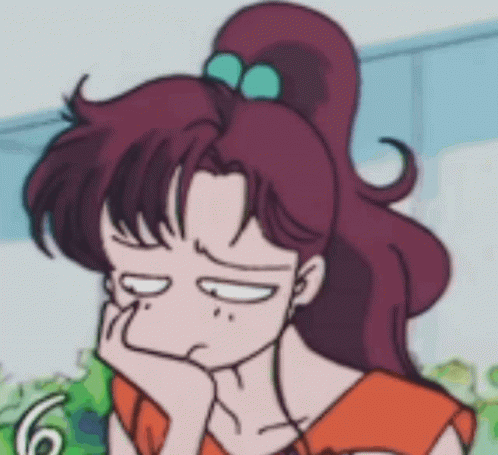
I studied Dramaturgy for about 3 to 4 years. And something you notice is how play-writing is the quintessential story telling. It’s making it work with the bare bones of a story.
Some other mediums have more finesse, more depth, or more spectacle - all amazing things that work for whatever they’re created for. But understanding a play, how and why it works, helps understand the fundamentals of any derivative story telling medium.
Particularly, conflict.
Conflict is dialogue and dialogue can take many forms. A story, in its essence, is a dialogue between two opposing ideas.
Take Batman, for example, who embodies the ideas of justice and order. On his own, he’s not a well rounded character.
If you ONLY present him, in a vaccum with nothing else, you don’t have a character. You have a list of characteristics that you’re supposed to know.
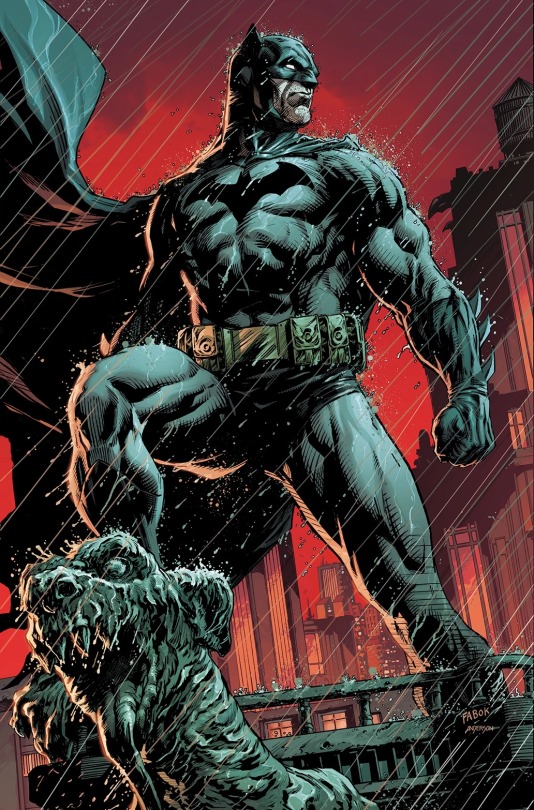
You only know who he is when you have dialogue with another character.
I say Dialogue, but it doesn’t necessarily mean spoken language at one another. Dialogue can mean fist fighting, playing tabletop games, talking to other people about the other, or even just a competition. The idea is to simply to compare and contrast both ideas.
If you want an example on how tabletop games serve as dialogue, watch the video “Well, Someone Had to Explain the Liar’s Dice Scene” by Lord Ravecraft
Another example, were we to retake Batman, you have him fight Joker. Who’s the embodiment of chaos and randomness.
In the following picture, you get far more information than the one previously shown. While the Joke fights with daggers and fake guns, Batman only uses his fists. He doesn’t use the tricks that Joker does. His serious demeanor, contrasted with Joker’s glee at the dangerous situation. The fact that Batman has a deathly grip on Joker’s shirt, while the Joker doesn’t, which shows a desperation to catch him.
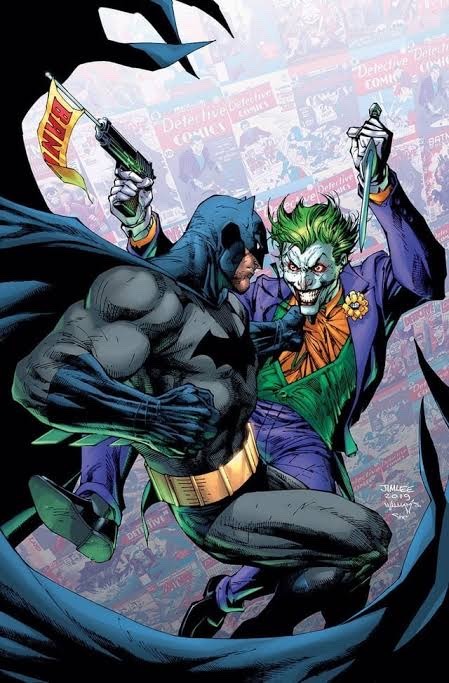
You are being shown, through a dialogue, who Batman is.
It’s so much easier and much more effective to explore a character through another character.
This is the reason why Shonen has a tendency to make incredibly good gay ships. If you want to explore Naruto’s personality, and his feelings of inferiority, you HAVE to have him interact with Sasuke.
If you wanna understand Hinata’s passion for volleyball, you have him enjoy himself the most with the only other crazy motherfucker who’s as obsessed with volleyball - Kageyama.
And I think that originally, Yana had this problem.
Sebastian was the protagonist, but she had little room to develop him as a character in the confines of the manor, dealing with random enemies.
She likely tried to create Grell as someone of the same stature as Sebastian. Someone who could be this other person to engage dialogue with and show or allude to his past a bit more.
The problem being that Sebastian didn’t care for his past. Or really, engaging with anyone. He sees everyone as below him, but when confronted with Grell who isn’t below him, he doesn’t wanna talk to her.
So you’re stuck in conundrum.
How do you have dialogue with a character, that as a character trait, doesn’t really wanna have dialogue?
Well, Grell also solves the problem. Because only the moment she gets him to start any semblance of a dialogue - is questioning why he’s serving Ciel.
And this is the moment when it’s perfectly cemented that the focus of the story is their relationship.
Why is Sebastian here? Why does he stay? What did he see in Ciel that made him want this extremely convoluted contract?
THATS the dialogue.
THATS the conversation we’re having in Black Butler.
We need to know Ciel because understanding who he is, let’s us know WHY /Sebastian/ is here.
Then slowly, with the introduction with the Undertaker, we find out Sebastian’s conflict.
Which is…
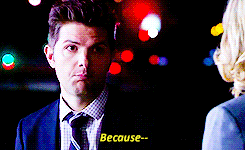
He’s scared of losing Ciel. It becomes apparent with the constant imagery of the Undertaker taking away Ciel and at some point even obtaining r!Ciel’s body, that he’s worried it might happen.
But he can only be worried that Ciel might be taken away if he wants to stay near Ciel.
And that’s his character arc.
Realizing that he actually likes Ciel, cares for him and the role he plays a butler that he doesn’t want this to end.
In the first chapters, he doesn’t feel a need to protect Ciel anymore than what’s strictly necessary. Just don’t die, that’s about as deep as his involvement in chapter 4 gets.
But by the Green Witch Arc, he feels a need to protect Ciel from ANY harm.
This is why I also said
3.- Their relationship is fundamentally a positive one.
In broad strokes, Sebastian to Ciel is the person who allows him to survive. He’s not worried about giving up his soul since he’s already dead. While Ciel to Sebastian, is someone who’s making him have fun. He’s slowly becoming more and more attached to Ciel and the life he has with Ciel.
Their relationship is not that of just a predator and prey, but also of master and pet.
In the terms that Black Butler itself would call: Sebastian is a wild wolf acting like a collared dog.
Ciel is aware that the wild beast will eat him at the end of the day, but if he clings hard to leash for now, he might just be able to have Sebastian maul his abusers.
Sebastian as a dog, currently finds that he enjoys being a chained dog.
(This is demonstrated in the Green Witch arc where he quite literally says, he doesn’t wanna be a wild beast and prefers to be a butler)
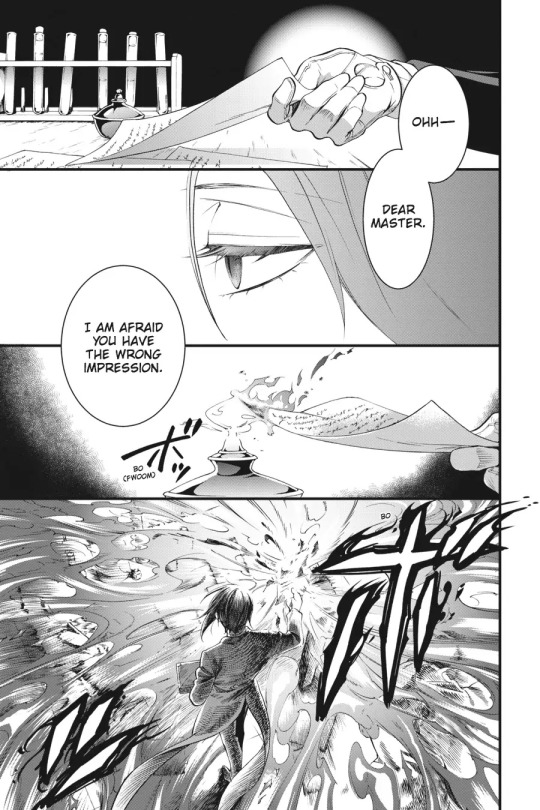
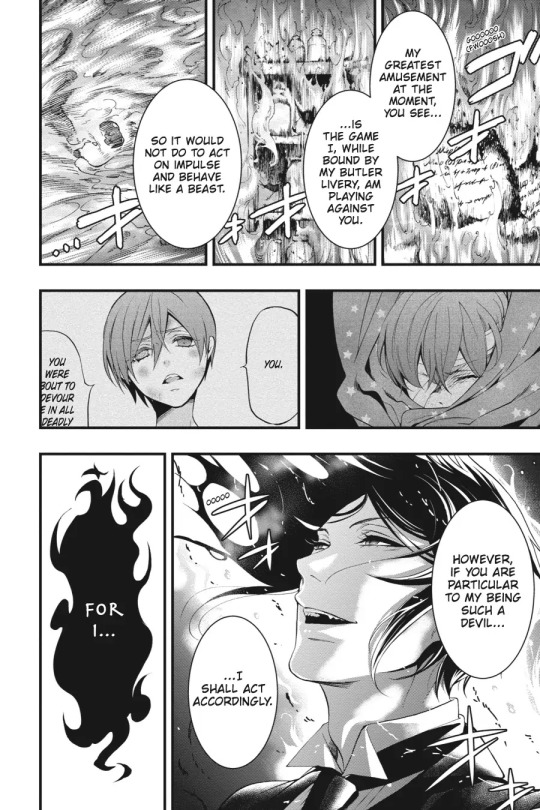
And much like the actual DOG Sebastian, Ciel constantly interprets his attempts to get close and protect him, as an act of aggression.
This push and pull of Ciel’s perception of Sebastian and Sebastian’s true motives is what feeds the story.
And the briefs interludes were that isn’t the case (what other people call the “plot”, but I would refer to as the connective tissue) such as Sullivan and Wolfram, the other servant’s past, the grim reapers and the like, serve as a parallel to Ciel and Sebastian relationship. Either to signify how they care for each other, highlight their weaknesses or fears, or explore how they feel.
It’s no surprise that Sullivan and Wolfram are parallels to Ciel and Sebastian. A sheltered sickly child who seeks the protection of a cold hearted machine that only knew how to kill, but who eventually found he cared for her genuinely.
Undertaker and Claudia’s relationship being heavily paralleled with them, even though we aren’t 109% sure what they had but heavily implied it was a romantic attraction from the undead supernatural creature and a Phantomhive.
Everything is a parallel.
That’s why, like the approach of the terrible original video, is flawed.
Trying to interpret Black Butler as action scene after action scene, with mystery after mystery with the only connective tissue being the mystery of who burned down the mansion - is missing the trees for the forest.
That’s not the point.
And if you’re too much of a prude to engage with gothic horror in its gothic horror game, I see little point as to why you even bother to engage with it at all.
A lot of people, including the person who create the video, simply refuse to acknowledge Black Butler IS the story of Sebastian and Ciel as a close and positive relationship, romantically and sexually charged. The reason for it being that they’re “put off” by it.
Part of me wonders how much that is genuinely true, and how much is just performative outrage. It’s like ignoring the fact that Cersei and Jami are in an incestous relationship and try to frame it as “platonic love”, because the idea of it is THAT off putting.
But regardless of that, if you don’t like the fact that it’s as canon as canon can get, I would reccomend you don’t engage with the story at all.
As I’ve explained, the entirety of the series is about them. If you refuse to see Sebastian and Ciel as, at the very least, a duo that cares deeply for the other - you aren’t reading Black Butler.
I have no idea what you’re reading.Perhaps your own biases and subconscious stigma with British aesthetic. At that point, watch the fucking British Royalty Gossip Magazine. You’d find more substance there.
Just don’t be like the person in the video, please? Don’t play dumb. Don’t ignore the fact that Yana is a Shotacon, don’t ignore the fact Sebastian is a hero, don’t ignore the fact that the entirety of the story is based on Sebastian and Ciel’s dynamic.
Because if you do, you are ashamed. You are ashamed of what this story is about. You don’t wanna engage with the text, you want to engage with yourself. You wanna project into Ciel whatever traumas and experiences you have, for the sake a vanity project, where you come out as the morally superior.
You don’t wanna talk about Black Butler, you wanna talk about how good YOU are. How you “don’t sin” by watching it “without all the gross unholy stuff”.
Which is the exact opposite of what BB is about.
So, if you don’t want to, save us all the humiliation fetish and leave.
932 notes
·
View notes
Text
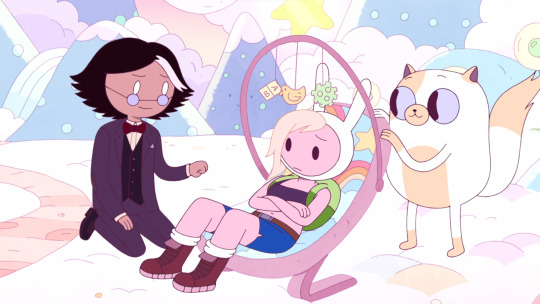
Okay, so I already wrote a bunch of stuff about how that scene, although it is really sweet, is also kind of a Bad Sign for Simon - how he refuses to learn the Obvious Lesson from the Winterworld adventure (that being the Ice King again is probably a really really bad idea). But I want to talk about it also a little more about what it means for Fionna’s character as well.
Because while sitting around and wallowing in self-loathing is probably bad for Fionna, especially after being told that she shouldn't be allowed to exist, and Simon is right to try and get her out of her funk. It's also still worthwhile for Fionna to have some introspection about the Consequences of Her Actions. Because she and Cake really did not consider them at all at first. They have a sense of morality and an instinct towards heroism, but they also tend to kinda forget the fantastical worlds they visit don’t exist entirely for their fantasy and have kind of a Protagonist-Centered-Morality fallacy.
Most obviously you can see it in the market in Ooo. How Cake, in her excitement, damaged and hurt and even killed
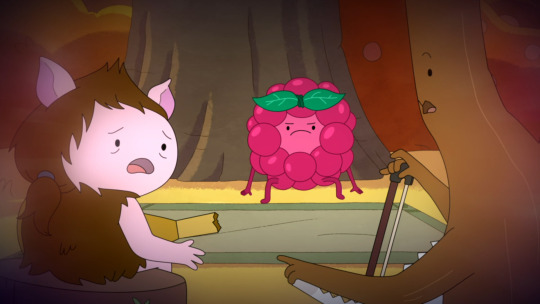
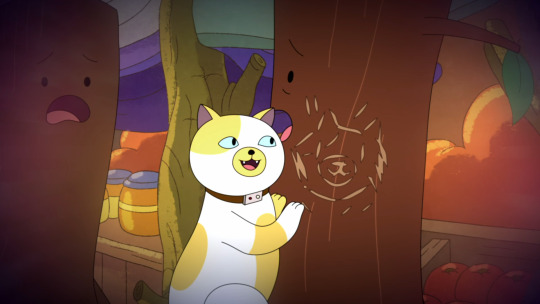

A bunch of innocent marketgoers without even noticing. And then Fionna immediately jumped to Cake’s defense against these ‘weirdos’, who were actually just normal kinda-righteously-angry Oooian citizens.
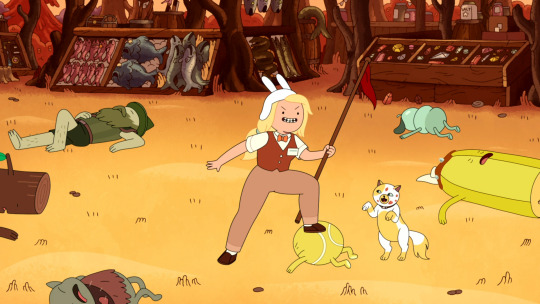
It’s actually very similar to the whole Winterworld situation. Fionna’s assumption that she’s automatically the hero and protagonist of the story and black-and-white view of the situation and her tendency to kick ass first and ask questions later meant that she just recklessly injured a lot of innocent people.
(It might’ve been worse actually cause at least in Winterworld she was at least manipulated by an evil Wizard)
Fionna and Cake clearly have a great potential for heroism, but they do need to be a bit more considerate of the situation and people around them. And it does make sense considering that from their perspective - they’ve been living a very ordinary life up until now (and Cake was literally an animal. A very clever animal, but still not bound by the same standards of morality as the talking animals in Ooo). Action and adventure and fantasy stuff has been purely the realm of daydream and video games for them - and Fionna literally speaks about it in these terms.
(also, Fionna's Main Character Syndrome was undoubtedly validated when God literally told her that she was created to be the main character of her universe)
So yeah, it takes them some time to really process how to be heroes - they need to grapple with questions that Finn and Jake already kinda dealt with seventeen years ago. And actually a lot of those; how to resolve a situation without necessarily using violence, when does a 'villain' actually deserve sympathy and kindness, the importance of the larger context of any given conflict... their confrontations with Ice King all played a big part in that. It was never just him, but he was still a very major part.
And for Fionna and Cake right now, learning these lessons require some amount of personal introspection. So while it was a sweet attempt at comforting, I dunno if Simon’s little ‘the only problem with that universe is that this Alternative Me was terrible because he didn’t even acknowledge or remember Betty as the love of our life and the light of my entire universe’ thing is actually Good.
I’m not quite sure Simon is the best person to teach Fionna and Cake heroism 101, because he is so focused on the Crown Quest as the thing that brings back Meaning to his life, and because his fatherly instincts just kinda go “Sad Young Person???? MUST GIVE COMFORT!” and also on account of the kidnapping.
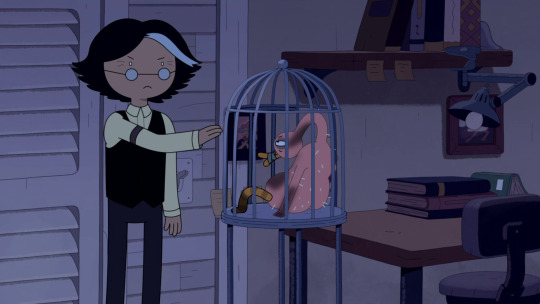
I’m sure Fionna is going to become the heroine she dreams about eventually, it’s just going to be a bumpy ride. The best we can hope for is that they accept Simon’s comfort, that she doesn't start believing that she is nothing but an Error for the entire universe like the Scarab claims, but don’t necessarily listen to all of Simon's his words either.
#adventure time#atimers#fionna and cake#fionna & cake#at#at spoilers#fac spoilers#f&c#f&c spoilers#simon petrikov#the winter king#adventure time fionna and cake#adventure time spoilers#adventure time simon#fionna and cake spoilers#fionna and cake series#fionna and cake simon#fionna and cake show#fionna campbell#fionna the human#adventure time fionna#cake the cat#adventure time cake#cake adventure time#simon adventure time#scarab#the scarab#fionna and cake scarab
1K notes
·
View notes
Text
I feel like with any sincere discussion of Veilguard we should start off by establishing that there are multiple forms of 'fun' as it were, to be had from video games. The main purpose of a video game is, after all, to be fun. To entertain us.
So. With Veilguard I feel the problem is this; Veilguard succeeds at being fun. It succeeds at the kind of actionable fun. Veilguard is fun to actively play for most people. The combat is fun, the level design is fun, the main storyline is fun whenever we get to it. Veilguard offers fun that is quick and instant. I think it was no small feat that BioWare has finally managed to design levels and combat for a Dragon Age game that feels complete. Although I will go to my grave defending the tactical combat of DAO, it is a different more gripping kind of fun that Veilguard's mobility and systems can offer.
But there is another form a fun. The kind of fun you might be more used to associating with a good book. The fun of a story you can't wait to see the end of. The fun of fantasy world building, of seeing the marvel that is an author, or a collection of authors, who know what their vision is, and who are subtle enough to communicate that vision through fiction. The joy of seeing the result of experts building their craft. Environmental clues, implications in dialogue, tone in atmosohere. Seeing a good story unfold is fun, and with video games, which are an interactive audio visual medium how much moreso?
A book is just words, a show on tv is always linear and restricted to what the camera shows us. A video game has a whole three dimensional world that you can move inside of, witnessing the story and world building both passively and actively. A video game has dialogue and characters, who can both drive and narrate the plot for you. A video game can put you inside the world the story is happening in and immerse you in it.
And I feel that Veilguard fails to take advantage of the full breadth of the vast collection of storytelling tools a video game has. The fact that the companion quests and companion writing seems to have been left incomplete, pieces wilting on the cutting room floor when the companions are meant to be the emotional core of this story? The fact that all the factions are presented as unambiguous good guys which leaves them with no depth, their stories woefully superficial and unwilling to engage in any deeper ideas? The fact that vast amounts of world building and lore have been essentially discarded? That is all severely unfun.
So I think it's fair to say that Veilguard is fun and disappointing and not fun. The fun that I had while playing this game was always followed by a collection of things that were not fun. And the most annoying part is the parts about Veilguard which are fun are the parts that are fleeting. That I can find combat in a video game entertaining, extremely entertaining sometimes, is nothing when compared to the staying power of a gripping story with not just good set up and pay-off, but also an immaculate structure supporting that all the way throug.
When I am 80 years old I will not remember fondly the fact that Veilguard was the first Dragon Age game to finally have an actual dodge mechanic. There are always going to be games with fun combat mechanics, Veilguard isn't special for that. But I will remember Solas turning into a dragon sized wolf in a desperate bid to fight a dragon ten times his size, to help the hero he became a villain to. I will remember what it felt like to have a protagonist start off by treating Solas with suspicion, knowing there was no reason to trust Solas but choosing to give Solas a chance to prove himself trustworthy anyway, and Solas breaking that trust. And I'll remember what it felt like to have that protagonist then face Solas again, and make a choice to either be kind or to be just like Solas.
You will sometimes see gamers who say they don't really care about the writing in their games that much, but then their favourite games are things like The Witcher 3, God of War, The Last of Us. The reason they say that is because the writing is so integrally a part of the gameplay experience they don't even realise how much work it's doing. Fun gameplay doesn't matter if there is no reason to continue it.
Do you know what I remember about Dragon Age Veilguard? I remember dreading opening the game and seeing the list of companion quests in my journal that I had no interest in doing, because I had already realised how nothing a lot of them were. And I'm not talking about the gameplay of those quests, I think we've established I enjoyed smacking the bad guys and moving through the levels quite a bit. Oh no. I'm not even talking about the dialogue, not really. It was the stakes. Why were these characters doing these things, and why should I care? There was so little emotional conflict in those early to mid game companion quests.
Do you know how plot structure works when you really boil it down? Conflict is set up -> tension rises -> conflict comes to a head -> tension releases. This is why you need conflict and this is why you need characters to have flaws that they will not self psychoanalyze to a resolution within the first 5 minutes of the story. The realisation of those flaws is the plot! The character overcoming those flaws is the plot. You can't have a story without plot! What are we doing here????
That's how those quests felt. They felt like all the actually meaningful things the writers of these sub-plots had to say got crammed into their final quests. With a couple exceptions. And that's why doing most of the companion quests felt like a chore.
So, anyway, in summary. Remember that a video game contains within itself multiple forms of fun. As many forms of fun as there are ways of interacting with a game.
#i am coping i am coping i am coping I AM COPING#veilguard spoilers#datv critical#veilguard critical#le sigh#at this point i am just stream of conscioussing my disappointment out there
84 notes
·
View notes
Text
crack scum villain theory: there is no "original" Shang Qinghua
how this works is, neither the world of SV nor the world of PIDW actually existed in any tangible sense before Airplane died. Airplane dying was actually the catalyst for the system, and whatever unfathomable cosmic entities are behind it, to recreate the world from the novel. that's why Airplane transmigrates into an infant, and also why the world mostly follows canon up until Airplane interacts too much with actual plot-relevant characters, and accidentally butterfly effects Shen Jiu into a fatal qi deviation. At which point the system determines that a dead Shen Qingqiu makes fulfilling the basic story requirements impossible or at least dangerously low in terms of odds, and brings in the second play (User 002, Shen Yuan).
SY is able to earn more points from the system than Airplane, but that's mostly thanks to his proximity to the protagonist not actual preferential treatment, and he seems to have more concrete restrictions on his behavior and limits on his mobility (OOC lock, entering into an already-established character, and of course being forced to ensure that Luo Binghe goes into the Endless Abyss) (this does make it ironic that he ultimately changes the most things). whereas Airplane seems to have more freedom to do as he pleases. the system doesn't even seem to dock him points for accidentally contributing to the death of a vitally plot-relevant character.
so the SV world was originally supposed to more or less just be the same as the PIDW world. it didn't change to any significant degree until Shen Jiu died.
I suspect, then, that the PIDW world which followed canon didn't exist as any kind of separate reality until Shen Jiu died of a fatal qi deviation and had to be replaced. at which point the system -- perhaps hedging its bets -- created two splintered timelines. one being the original sandbox for Airplane to play in and continue to alter, the other being a manufactured reflection of the story's original outcome, possibly to serve as some kind of emergency back-up character bank or reference outline.
which means that the PIDW version of this reality isn't a full and cohesive world. though of course the people there don't know that. it's mostly just a tool for the system, which is why we first encounter Bingge being utilized as an enforcer. Bingge and everyone else who exists in the PIDW reality, they all remember their past as the story and are at the end point of what Airplane had written, but none of it actually happened. they instead sprang into existence at their narrative end point.
since the Shang Qinghua of Airplane's novel died well before the end of the story, characters in the PIDW have various recollections of a "Shang Qinghua" and his death, but they are vague and ultimately do not reflect the tangible events of a world the way that the SV timeline does. they are artificial memories based on a story. PIDW Shen Jiu likewise never really existed, although SV Shen Jiu did. similarly, all the history of the SV world that supposedly happened before Shang Qinghua was born never actually happened either. that's all constructed as well, which means that in a weird kind of a way, no one in the world can actually be older than Shang Qinghua either. they can only have manufactured memories that give them that impression. which means Airplane is the oldest being in that entire universe. he'd even be older than his own parents, because they were created to be his parents the moment he was born.
so there's no other Shang Qinghua. everything prior to Airplane's transmigration in the SV world and prior to the last PIDW chapter in the PIDW world is like when a video game designer seeds a dungeon with a skeleton and a bunch of notes about how some lone adventurer got lost and died there. at no point in the game was there ever actually a live adventurer in place of that skeleton.
that's "original" Shang Qinghua. he doesn't exist, because in one reality he's only ever been a version of Airplane, and in another he's a skeleton in a video game dungeon.
201 notes
·
View notes
Note
I believe Wolfgang was a genuinely good, but misguided character.
And I believe if he hadn't died in chapter 1, he only would've become more misguided. But in a way that's entirely justified from his POV but terrible from Damon's and Eva's.
For example, imagine that he reads into Damon and Eva's speech from chapter 1, and how they think group bonding is only a way to get other people to lower their guard (at least from them). He also sees them being apathetic to idea of murder. He then sees Damon and Eva getting along with the others and participating in bonding moments they themselves basically deemed only useful for potential killers. Wolfgang overthinks this and spends the whole night up awake worrying about everyone else.
Heck, about Eva, he'd be correct in the case of canon, her bonding moments with the larger group (gaming tournament) were only a cover-up for murder. But this isn't canon, and we're basically going off of the AU idea that Eva spends more time thinking about the killing game tuan the postee, gets dragged to the tournament by Diana who isn't busy that day, and has fun and bonds with the group, especially Cassidy with their niche favorite video game (You could also have Eva not bond with the group, but just not commit murder as well for this AU).
But Wolfgang doesn't see this. He only sees people who deemed bonding moments murder opportunities engaging in those exact moments. He overthinks this so much that he distorts his own perception of Damon and Eva, from classmates who accused people of being potential murderers and sabotaged the group's spirit (still a horrible thing to do, but not as horrible as what he thinks they are in this AU), to possibly cold-blooded murderers who are taking their opportunities (big emphasis on possibly here, he doesn't see them as monsters, but he also doesn't really see them as people due to his twisted perception).
And he starts doing what he thinks is right. He begins asking Diana and Kai whether they feel safe at night, whether they'd like to switch rooms to room with eachother or Grace and himself, that its fine for them to ask to do so and no it won't inconvenience anyone in the slightest, he asks Toshiko to stay away for them, as shes in potential danger because of her age, he asks Desmond to keep an eye on them as Desmond's a marksman and he'd surely be able to defend himself incase anything happened, he starts being a little more vocal about them being suspicious then more and more, he keeps an eye on them every time he sees them with the group, whenever they're close to being left alone with only one other person he makes sure to stay behind so nothing happens.
But just because he's the hero of his own story, trying to protect his friends from people he thinks are going to hurt them (to reiterate, this isn't entirely ungrounded in fact, Eva did murder him in canon) doesn't mean he's not the coldhearted villain of another. Damon and Eva don't see these action as "harmless" or "preventative". They see him trying to ostracize him, asking Desmond to basically stalk them, making Toshiko run away, sabotaging their relations with their respective roommates to make them alone and less safe at night, never letting them be alone with one of their classmates and fostering distrust between the group while preaching the exact opposite. They see him as a giant hypocrite who is entirely delusional.
in short, I really think villains who are nice and kindhearted to everyone but the protagonist are cool and should be featured more.
(Most of this is AU but I think it could've had a decent chance to become canon if Wolfgang and Eva were long-term characters)
⠀
56 notes
·
View notes
Text
I wish I could get past this because there’s a lot to enjoy in this game but I really keeping going back to it. The Veil was an unnatural magical ritual that separated part of the world from itself. Both material and spiritual beings suffered because they were cut off from a part of their world. The core purposes of Solas' mission in tearing down the Veil was to rectify this. And Veilguard just… decided to basically ignore all of this. Which I'm still trying to get my head around.
This being ommited is beyond disappointing for me for two reasons. First the lost potential. I was so excited for this storyline. A choice-based RPG where the villain has an ethical reason for bringing on the apocalypse. It puts the DA4 protagonist in such an interesting position. I've always remained undecided as to whether the Veil should come down and was expecting this game to let me explore that? But no not even a little? I can understand wanting to take it into a simpler direction of good vs evil (this is a video game after all) but removing this element from the story? That's just such a wasted opportunity.
The second reason is ommiting this completely changes who Solas is. From my reading of Inquisition/Trespasser- he viewed the Veil as his mistake- it was causing suffering by remaining in place and it was his duty to undo the wound he inflicted on the world. He is still leading a rebellion to free the people- only the oppressive agent is the veil. And he has a point- which is what was going to make him such a brillitant antagonist. But without that point- by changing the fact that the Veil causes harm- honestly his entire character falls apart for me. Or rather he just seems a different character entirely- I still enjoyed moments from that character but he’s just not same Solas from Inquisition.
72 notes
·
View notes
Text
Common character archetypes in literature
Character archetypes are universal patterns of behavior, personality traits, and motivations that are commonly found in literature, mythology, and other forms of storytelling. They are often used as a shorthand to help readers quickly understand and relate to a character's role and purpose in the story.
Here are some common character archetypes:
The Hero: The hero is a brave and noble character who goes on a quest or journey to achieve a goal or overcome a challenge. Examples of heroes include Odysseus in Homer's "The Odyssey" and Frodo in J.R.R. Tolkien's "The Lord of the Rings."
The Villain: The villain is an evil character who opposes the hero and tries to prevent them from achieving their goal. Examples of villains include Darth Vader in "Star Wars" and Iago in Shakespeare's "Othello."
The Mentor: The mentor is a knowledgeable and seasoned figure who directs and encourages the protagonist throughout their adventure. Examples of mentors include Gandalf in "The Lord of the Rings" and Obi-Wan Kenobi in "Star Wars."
The Trickster: The trickster is a mischievous character who uses their wit and cunning to achieve their goals. Examples of tricksters include Loki in Norse mythology and Hermes in Greek mythology.
The Damsel in Distress: The damsel in distress is a female character who requires saving from a hero. Examples of damsels in distress include Princess Peach in the Mario video game series and Sleeping Beauty in the fairy tale of the same name.
The Wise Old Man/ Woman: The wise old man or woman is commonly portrayed as having immense wisdom and expertise, and often acts as a mentor or guide to the protagonist. Examples of wise old men and women include Dumbledore in the Harry Potter series and the Oracle in Greek mythology. Such archetypes have been frequently employed in literature over time to communicate universal themes and concepts about human existence.
The Innocent: The innocent is a pure and uncorrupted character who often serves as a symbol of hope and goodness. Examples of innocents include Dorothy in "The Wizard of Oz" and Boo Radley in "To Kill a Mockingbird."
The Outcast: The outcast is a character who is rejected by society and often feels a sense of alienation or isolation. Examples of outcasts include Frankenstein's monster in Mary Shelley's "Frankenstein" and Hester Prynne in Nathaniel Hawthorne's "The Scarlet Letter."
The Temptress: The temptress is a seductive female character who lures men into danger or temptation. Examples of temptresses include Circe in Greek mythology and the character of Delilah in the Bible.
The Scapegoat: The scapegoat is a character who is blamed for the problems or issues of others. Examples of scapegoats include Tom Robinson in "To Kill a Mockingbird" and Piggy in "Lord of the Flies."
The Rebel: The rebel is a character who challenges authority and often advocates for change. Examples of rebels include Winston Smith in George Orwell's "1984" and Holden Caulfield in J.D. Salinger's "The Catcher in the Rye."
The Everyman: The everyman is a relatable character who represents the average person and often serves as the protagonist in a story. Examples of everymen include Bilbo Baggins in "The Hobbit" and Winston Smith in "1984."
The Wise Fool: The wise fool is often portrayed as someone who appears to be simple-minded, foolish, or even insane, but who possesses insights and wisdom that are not immediately apparent to others. Examples of the wise fools include the protagonist in "Diary of a Madman" and Yorick in "Tristram Shandy".
The preceding list outlines the typical character archetypes found in literature. Can you determine which archetype best fits your characters?
If you want to read more about The Wise Fool archetype, click here: The Wise Fool - Who is that?
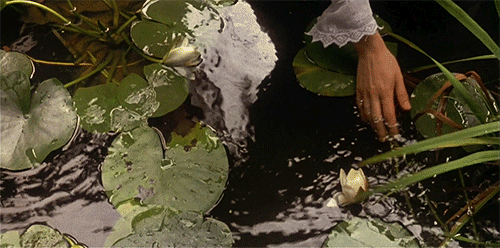
#creative writing#writing#writer things#writerscommunity#writeblr#own character#on writing#writersociety#writing community#writers#writetip#writing tips
734 notes
·
View notes
Note
I just saw someone on the main sub who argued that the way Jacques was dealt with “made the protagonists look incompetent”. Namely, they said that all it took was for Willow to stop being a stepford wife, and hand over her video recordings. Jacques was psychologically abusing Willow, and that made her too scared of retaliation to do anything until Weiss helped her break out of that cycle. The people in that subreddit (including the poster) also called Ghira “evil” for starting the WF. Uh, the WF used to be a peaceful organization until violent extremists hijacked it? You know, like how Hitler hijacked the Nazi party, Lenin hijacked the Russian socialist party, and Castro hijacked the Cuba Libre movement? It astounds me how many people forget that plot point. Lastly, they also tried arguing that Nicolas was responsible for the SDC’s bad business practices, that him being hailed as a hero is “bad writing”, and that in a better story, Jacques taking over the SDC would make it morally better. Nicolas personally led all dust mining expeditions, treated his workers fairly, and fundamentally changed the lives of Remnant’s people for the better. The WOR video for the SDC explained this. Why do people on those subreddits spend so much time and energy defending Jacques and demonizing Ghira and Nicolas? It’s ridiculous!
I found the post this time.
1- "They didn't involve any Fanaus in the fall of Jacques!"
I kind of see this since Jacques' abuse of the Fanaus is a major point. But like, this was only really focused on by Fanaus characters in V1. V2 and 3 had Blake focus on the WF. Her story is primarily about the WF. That's more an issue with segmenting the conflict.
2-"If it was this easy, why not film Jacques' abuse of the Fanaus?"
"Jacques: That's precisely my point. We offer Faunus the exact same wages given to the rest of our mining staff. Their argument's completely invalid right out of the gate."
Because companies can easily side step these issues if the society around them doesn't really care? Especially since its implied Jacques' abuse isn't based on race but on vulnerability. So any accusation of bias falls apart because it's implied ALL his workers suffer.
Also being caught abusing workers is bad. ... Being caught fixing an election with a known criminal is WAY worse.
3- "What are Jacques' crimes?"
The line above and his open abuse of Weiss. Funny how his familial abuse doesn't get mentioned.
"-the show hands us the destruction of the only real villain among the parents of the main cast (weird, considering that Raven genocides villages with her tribe and Ghira started the White Fang) on a silver platter."
I'm just gonna directly quote the guy on this and Willow because no one is gonna believe what I am saying here.
A. Ghira was the leader of the PEACEFUL WF.
And B Raven lost her decoy, got humilated and shouted down by her daughter and proceeded to run off, implied to be scolded by Taiyang.
Gonna go ahead and say the narrative doesn't sympathize with her. Even though her showing regret fundamentally makes her better than Jacques ever was.
Also I found those comments about Willow.
4-
"Jacques going down because the worst Mother in RWBY decided to not being a drunk coward for 5 seconds is so funny to me. For all his useless and braindead plots the mains are also that stupid that if it weren't for that he would have gotten away with it."
Willow being more of a deadbeat than Raven is the funniest thing ever lol.
"I mean say what you will about Raven leaving. Willow stayed and watched Jacques abuse 3 of her kids, totaled her families legacy, mistreat and oppress an entire race and even when she had the cameras and therefore evidence to stop it and let the sufferring continue. She even attacked and nearly killed her own daughter when she tried to leave. Like Raven needs to step her game up if she wants to compete with Willow. Her calous cowardice has had generational worldwide consequences. Like show me Raven trying to kill outright Yang and maybe she'll be in the same league."
Raven actually saves Yang's life at least once, which is more than that deadbeat Willow could fathom doing. Is there actually a single good mom in this show besides Summer Rose who has never appeared in the story proper?
(The italicized words are the OP's)
I'm sorry, are we just gonna forget that Willow was being abused by Jacques and dealing with her own issues, whereas Raven jumped town and never came back despite having a portal to her?
Or that Raven actually used her daughter, her half-sister and her BROTHER as bait/for an exchange just so she can fuck off and hide?
This whole post was a fucking failure and honestly, against my rational side, I'm convinced the reason why this wasn't downvoted to hell is because the critic subreddit probably got linked the post and people missed it.
Also the reason why people defend Jacques? Contrarianism.
'RWBY bad so thing goo because show say thing bad.'
21 notes
·
View notes
Note
Honestly, the thing that pisses me off the most about Fates's story discourse over 3H story discourse is people stretch themselves to find depth in 3H that doesn't exist, while dismissing Fates outright and assuming it has no depth. All entirely rooted out of the fact Fates is a good story with a bad first impression, while 3H is a bad story with a good first impression, and to most viewers, that's all that matters as opposed to the actual critical analysis of the work itself.
Like, look, I get it. A fun fact: Fates's story in the West was actually better received than IF was in Japan, as while Fates ultimately had a few proud troopers (usually at college-level analysis) who understood what was actually being said, IF apparently botched the script given by Kibayashi badly enough (including much of subtext in Japanese making very little sense on top of poor diction, in the language all about poor diction and subtext) that Treehouse had to clean-up and fix as much as they could while working with the flaws, which is why they were super heavy on people reading into the subtext to get Kibayashi's vision. I get why people make that mistake and assume because the impression is bad it's all bad, we've seen that with so many works of fiction in the past!
But what gets me is when somebody dismisses perfectly good content with tons of depth, meaning and value solely based on first impressions, while giving a pass to anything with a good first impression even when the logic and rhetoric does not follow through. And like, I get why people do this. First impressions matter a lot and is defaulted in being a survival strategy, where you often can't verify what somebody is like except by the immediate first glance of judgement; what separates us between "us" versus "them". And I get why people do this with IRL people, it's why I work so hard to give a good first impression… but fucking honestly, a lot of these stories are fiction, with the information searchable online. You can read about fundamentally crucial plot points and the truth behind the work just from looking up the information online! Video games aren't reality, and thus don't need to actually require the first impression rule… but for most people, it does anyways, and causes people to dismiss perfectly valid or solid content solely not based on the quality it has, but based on bad first impressions in works either unintentionally (FE Fates, Ayane Matsunaga in Persona 4, etc.), or maliciously misrepresented due to author bias (SMT Law, Leon Kuwata in DR1, etc.). What causes me to get so annoyed is when people dismiss what the author has to say or go full on "death of the author" like the author or narrative's input or opinion doesn't matter. It does. You cannot divorce context from the author's ideas and thesis and make it what you want, you've created a fanfiction then! And then you have so many FE fans just assume Fates has no depth whatsoever and that people have to justify to like it, even when it very clearly does in its main text that people reject because it's not a good first impression… it's a vicious cycle rooted in initial fans' disappointment of it not being Edgelord/Villain FE4 like they hoped and instead being... very empathetic and not afraid to have a protagonist (especially male one) have emotions and not afraid to share weakness or cry. And what infuriates me is that when you present evidence that proves the first impression wrong… many people double down and don't actually correct themselves based on the information! That's what infuriates me, as it's a failure to be a good person or care about doing the right thing!
It annoys me as much as it does as somebody who's worked with Autistic kids and is Autistic, and I know the pain of feeling like your insights are rejected based on first impressions than the actual truth of the matter. People need to accept that whatever interpretations of canon they have on a story is irrelevant versus the express purpose of the text, as stated by the devs, because without having the truth, how can one hope to be a good person? "Follow your own justice" with your eyes blind and ears deaf to the consequences of your actions? No, that's when people get hurt, and I get especially vocal because Fates – especially Conquest – has a downright brilliant story that's layered underneath a ton of bad first impressions, and while I get the rule of making judgements based on presentation, that's still not a reason to dismiss the context or spread blatant misinformation or misrepresentation on what is actually happening in the story. If you cannot expressly or accurately talk about the context of what happens in the story divorced from your own headcanons and actually sourced arguments from the text and author's Word of God, you're not qualified to actually talk about it. End of story.
Like, I don't know about what others think, but if I'm giving a bad first impression and say a bunch of things, and then are presented with evidence said bad first impression is wrong… I immediately apologize to the person or thing I've offended, delete anything that I've said that was incorrect about it and firmly stand by them over said first impressions. It's not hard, and it doesn't make you lesser for admitting you were operating on faulty information. What does make you lesser is when you reject that evidence or truth to double down and not actually focus on doing the right thing by correcting your information! I genuinely don't understand it, because it's like somebody being tried at court, evidence comes up that clears their name, and the jury rejects it because, oh I dunno, they're something like a non-offending person with pedophilic disorder (just an example of how a stigmatized group can bias people by conviction via public opinion, and that is ALL I'll say about that land mine), or a communist in the 1950s/anarchist in the 1920s. It doesn't make any sense!
Obviously, bad first impressions shouldn't be dismissed entirely, especially when it turns out to be true... and most of the time, they do! If something stinks of awfulness, chances are it is awful. But the thing that really aggravates me is how much people don't realize they're misrepresenting something that isn't even bad, just poorly understood and continuously misrepresented. There are works that give a bad impression that are bad and works that give a good impression that are good. But I always found it frustrating how people chose the one with good impressions but bad intent or logic over the one one bad impressions but good intent or logic, even when that's not remotely the truth nor is it accurate to the context or subtext. And personally, I'd happily sooner look past something with a bad impression that is actually good, versus something with a good impression that is actually bad. This is what frustrates me about how 3H is given a pass while Fates gets shit when if you actually analyze the text from a college-level reading ability, you begin to see it's the reverse; Fates is downright genius if you actually interlayer the context and subtext, while 3H just flat-out falls apart.
I will say, though, it certainly didn't do favors for my faith in people's ability to read and appreciate canon text. I already have tons of faith in humanity; stuff like the above makes me honestly lack faith in people's ability to be rational or intelligent about context. All I will say is if people like Odovakar's abysmal Fates analysis (asking anonymously so look it up) were given to a college-level course, he'd fail straight out of that exam.
I wish I can go more in-depth like this post deserves, because you make a lot of good points. It's just a lot all at once haha.
What I will say is that while I slightly disagree with the idea that audience reaction has no relevance, this discussion does remind me of what I'm studying in uni right now, things like structuralism vs post structuralism.
What we deal with when it comes to the FE fandom is heavy, heavy doses of post-structuralist (acknowledgement of multiple valid interpretations) analysis that is spun as structuralist (one true meaning that is stable and predictable).
Ultimately, where the best literary and analytical thought comes from is the recognition of both author circumstances and the resulting text product having an impact on an individual's perception of the product.
I dislike 3H's story based on this "equation"; a significant amount of lore that serves little to the plot, characters' entire beings are undercut by the whims of the player insert, and no deep or thought provoking theme beyond whatever each route wants to serve to you leading to the game lacking a strong core (this is within the product) + the devs and writers literally admitting that their product 'gained a life on its own', that there was no one person who knew everything in the plot, and no one in the room telling them to fucking stop (author circumstances) = my perception of the story being that it's a dreadful mess that doesn't know what it wants to be beyond a lore simulator with cute characters who you teach and have tea with.
That's my personalized reaction backed up by subjective analytical thought, as well as sourced facts/circumstances and standard literary criticism. Now I can't expect every single person to go through those steps, but as you said, it's as if the first impression and surface level shit supersedes all of the muck that is under 3H's story, whereas with Fates, the first impression is so irrevocably bad to most people that almost fucking nobody is willing to even entertain that it may have a good story without first coating their sentiments with irony, sarcasm, or timid apologies in advance.
It's so utterly transparent, and so utterly unpopular to point out, because that's the type of gunked up social contract that the community has created and perpetuated. Breaking that resigns someone to mockery, shame, or plain confusion.
But like you, I care immensely about things past first impressions and how things are presented. Why else would I talk about these games years past they've released.
Anyway, thanks for the ask. I never heard of the Japanese reaction to IF being worse than the Western reaction to Fates. I will admit, it's hard to swallow, but I recognize that it's because of the culture I'm inundated with and involved in, so my bias in is full force. Really, all I know was the shit that was completely changed, added, or removed from the JP script to the localized one, but were I to look into it more, I bet I'd see what you're talking about regarding the text in its native language.
29 notes
·
View notes
Note
So for your MLP Weapons AU, is there like…a set protagonist? Or is it supposed to be like a video game where the player (or reader in this case) is supposed to see themselves in the adventure?
Also is there any way for the soul/pony inside the weapon can communicate with the wielder? Maybe a ghostly image only they can see, telepathy, or talking in dreams? It’s cool if you don’t, just wondering/I kinda like that trope.
MLP Weapons AU
TBH I was hoping someone would ask this! Ty for stepping onto my trap card! XD
TLDR: The Weapons AU is an RP setting.
Not an RP with me specifically, but more like... If you see the AU and you/your friends want to make OC's to fit the role of the 'New Elements' kind of deal. I think roleplay is a fun way to interact with each other and make your own stories!
(Plus it means I don't have to make yet another comic series LMAO)
I'm like the DM, showing you who's in the world and the challenges you could face along the way. You make the characters, I'll make the adventure!Most of the ponies I design are going to be allies, altered characters, or villains. I might even make some YCH stuff so people can add their own characters to the art of the AU!
As for the spirits....
Yeah! There's definitely a way for the Spirits to communicate and interact with their users! I really do like the idea of having their 'ghost' be visible to the user, because that allows for me to draw them. I imagine they'd also use telepathy in fights when they need to communicate quickly.
The dreams though... Hm. That's an interesting one. I do think the Spirits of the Elements are capable of that, but the realm of dreams is where Nightmare Moon's power lies...
Nightmare Moon/Luna could definitely sense the Spirits appearing in their users dreams. That might be the way the current user of Nightmare's Harvest finds the New Elements and starts hunting them. Doing so may put the New Elements in peril as they search for their weapons...
#mlp#my litte pony friendship is magic#my little pony#mlp fim#mlp au#mlp au lore#ask#ur-typical-nerd#MLP Weapons AU
22 notes
·
View notes
Text
As someone who has always found antagonists to be incredibly compelling within a narrative, l've spent some time really looking into some of the elements the writers and developers used in the creation of Red Dead Redemption 2's antagonist Micah Bell.
One of the first things that stood out to me about Micah was the title of one of his main missions, "Blessed are the.... Meek?"
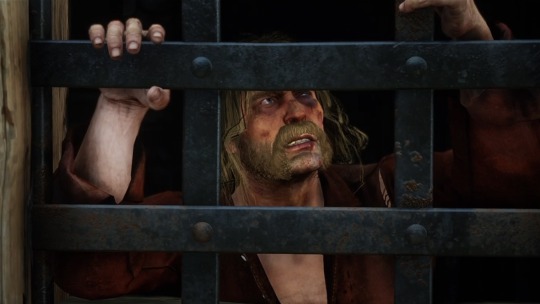
The naming of this quest is significant in several ways. First, it's a clear nod to the biblical verse Matthew 5:5, which reads:
"Blessed are the meek, for they will inherit the earth."
This verse implies that through gentleness, humility, and virtue one can be deserving and worthy of God's favor-in simpler terms: those who are righteous and good will receive a reward. They will win, in the end.
It's particularly interesting that this is the quest that gives us our first real solo interaction with Micah as a character, as well as setting the stage for future events in the story. From what we can tell of Micah thus far, he is anything but meek. Micah lives by his own rules, and shows little regard for others. He is the antithesis of gentleness-which is made abundantly clear as he thoughtlessly and impulsively ropes the player into shooting up half of Strawberry.

The quest title presents a level of irony and foreshadowing of Micah as a character. Micah is not meek, though in contrast one could argue that protagonist Arthur has many instances where he is the example of virtue and honor. By this logic, Arthur's honor should be rewarded, right?
However, that’s not what happens. Rather, at the conclusion of Arthur's arc we see him lose everything—his dreams, his family, and his own life. And we see Micah Bell walk away, alive…. in one of the most heartbreaking character endings in video game history.
Another interesting character design choice of Micah comes from classic western film tropes. In classic Westerns, the heroes were seen wearing white or light colored hats— in contrast, the villains were seen in dark colors, such as black. This was a simple technique used to signal to the audience who was good and who was bad in the story.
In Red Dead, we see a subversion of this trope. Arthur wears a black hat, and Micah (our antagonist) wears a white hat. This is a subtle foreshadowing that despite everything pointing to Micah being the villain, he may still be victorious in this story.
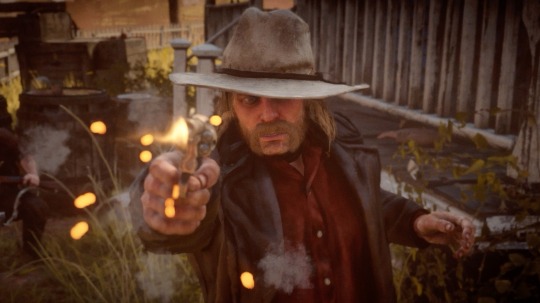
This example illustrates a theme that despite someone's virtue and honor, they may still suffer. Sometimes, justice does not prevail— at least not in the ways we expect. And while it is a tragedy, it is also a poignant exploration of what it means to be human.
#micah bell#rdr2#rdr2 micah#micah bell analysis#rdr2 analysis#blessed are the meek#biblical symbolism#revisionist western#short essay#antagonist
35 notes
·
View notes
Text
I don't think anyone who wants to play only Black cards in [Magic: The Gathering] is a bad person, or that anyone who wants to play only White cards is a good person.
I'm going to repeat something that a lot of people probably didn't read about my last, long post about the White and Black Colors of Magic: The Gathering.
====
Back when video game studios weren't terrified of offending anyone, they used to provide "Morality Paths" in their games.
No one lied to you about which path was Evil, or at least Anti-Heroic.
To deny that the Pacifist Route of Undertale was Good and that the Genocide Route was Evil would be to insult your intelligence and rob both paths of any meaning.
HOWEVER, if anyone tried to argue that only "Evil People" wanted to play as evil characters, everyone knew not to take that person seriously.
I don't think that there's anything wrong with someone who only ever wants to play with Black cards.
I only think there's something wrong with a person when they try to tell me: "The Color Black has nothing to do with Evil, and the Color White isn't actually Good".
If someone tells me pepper isn't spicy and salt isn't salty, it only reveals how tasteless they are.
====
Bad people can like playing nothing but White cards because of White's wholesome aesthetics. For the same reason that bad people can like beautiful sunsets, lovely music, sugary sweets, and being trusted and praised by the people around them.
Real people who want to deny that they have any character flaws, or bigoted opinions, or any capacity to do harm or evil will surround themselves with wholesome, clean, cutesy iconography and symbols and associations. This is called "Virtue Signaling".
The most toxic people in the world have the most vested interest in appearing harmless.
Before Harry Potter became a dirty word on the internet, people could rightfully reference Dolores Umbridge, the cruel, petty, paranoid, hateful monster who tried to convince herself and everyone that she was nothing but sweetness and light and righteous.
As a person, Dolores Umbridge would play nothing but White cards and would clutch her pearls to see anyone playing Black cards. She would pretend to faint if she so much as touched a Black card.
Which is funny, because if a fictional character like her were accurately represented as a Magic card, she would be pure Black. She may not have been Dark Lord levels of ambitious, but no one who was pure White could have "inventing instruments of torture" as a HOBBY, let alone take delight in making other people suffer, or pledging allegiance to an actual Dark Lord as soon as he replaces the legitimate government as the ruling power of the land.
Because while Magic HAS to choose Colors that accurately reflect fictional characters, real people can choose Colors that have nothing to do with their personalities at all.
Be honest: In terms of real personalities, Blue must be over-represented in the Magic: The Gathering player-base compared to Red. How many impulsive, athletic 'dude-bros' would rather learn the rules, collect the cards, construct the decks, and sit down to play this game... instead of going outside to touch grass and kick balls around? Or at least playing a video game like Call of Duty.
By the same token, if only bad people played Black cards, almost no one would play Black at all.
Good people can like Black's horror aesthetics for the same reason good people can like Halloween, horror stories, and slasher movies. It can be fun to play the villain!
Games are safe ways to explore our darker fantasies because we're not causing real harm to real people. It's all make-believe.
But it's a Red Flag when someone says, "Actually, the villain is the hero."
Not in the sense that the villain is the protagonist, or the protagonist is an anti-hero fighting a worse person, or the protagonist only looks like a monster, or the protagonist is actually a hero being framed as a villain by an actual villain.
I mean in the sense of, "I think Pennywise the Clown, the child-eating boogieman, is an ally to everything I want to see happen in the world."
Or, "I think the mass-murdering psychopath is a decent fellow as long as he only murders people with a skin complexion I don't like, or if she only kills men."
Or, "Morality is subjective or a lie, there is no truth but power, and there is no inherent, sacred value to all human lives."
#magic the gathering#mtg#white magic#black magic#moral relativism#dolores umbridge#there is no truth but power#color pie
54 notes
·
View notes
Text
Re: popularity and clout gap, this thought has been lurking at the back of my mind but it didn’t hit me until a friend pointed out it was like how some parts of the audience used to treat hermits in MCC. As in: the hermits could achieve something technically amazing but were ignored simply because they weren’t popular (see False’s back to back win being ignored post MCC12) when the exact same achievement would cause them to lose their minds if it was done by someone who was more “popular”.
Post Demise 2, I joked this was like Blue Bats over again in which False (and Ren) won with the power of friendship in a wholesome storyline yet some parts of the audience chose to be salty their fave didn’t win instead. Sometimes you can see such a severe cognitive dissonance because people watch different hermits. Like that post on Reddit innocuously asking about Perry when I’d seen him around for weeks now and people pointed out Perry had been featured in the Neighbourhood’s videos for a while. (Nothing wrong with the post but it shows how vastly different the viewing experience is.)
It’s kind of like we’re back to 2020/21 era esque “hermit erasure” but it’s (unintentionally) done by some hermit fans. Okay, actually I’ll erase the unintentionally. Plenty of people only watch a few hermits and I emphasise that is fine and you can do anything you want forever. Enjoy HC in any way you like. Be free. The problem only surfaces when people pretend their corner is the only corner that exists and everyone else are the side characters. Like, it’s really fine to admit you don’t know everything. Someone on the MCC Reddit tried making teams and admitted they didn’t know the hermits well but somehow their teams ended up being more hermit accurate than most teams I’ve seen.
This situating done by some parts of the audience of some hermits as “main” and some hermits as “side” to the whole production of Hermitcraft makes me think of 2020/21 MCC again. In which people were discussing protagonists and villains and cannon fodder. Which was why I wrote Battle Scars, a parody / satire / sincere piece of work / whatever, to show that my faves (Blue Bats) could be the protagonists too. And it feels like I’m back. Scrambling to script my faves as characters worthy to have their stories told. Why are we back again.
And why does it lowkey feel worse because this is happening within the same fandom.
… And now I realise that’s also part of why I wrote Feel It Still, another crack treated seriously fic. Because it’s a Superhero AU proudly situating my faves in the lead roles based on canon stuff, while the typical protagonists of Superhero AUs in this fandom are delegated to side characters and are the trainees under a main hero. It’s this sort of twisting of canon that I keep on (subconsciously) doing, attempting to give some sort of spotlight to my faves by mimicking / parodying fandom trends and tropes, trying to make them more palatable and spread propaganda or whatever.
Tldr: it feels like we’re back to “hermit erasure” era and there’s a lot of fanon attention on a few. And you just know certain events would receive significant more attention if they were done by the popular hermits instead of the less popular ones. But it’s mostly crickets outside my circle and the people that I know of. Like hey yeah this is someone I know from chat and someone I know from Twitter. And I know about “being the change you want to see” and “make stuff you want to see” and “promote your faves”. I know. We all know.
It just gets tiring sometimes.
In the end, a number’s game is a number’s game.
77 notes
·
View notes